#nobody talks about the acting this man does every episode
Explore tagged Tumblr posts
Text
Jon: I am a professional who will read these statements I to a tape recorder. I am a professional man which is doing my professional job (:
Also jon: puts his whole ASS into PREFORMING each statement, perfectly documents the decent and spiraling of each statement. PUTS HIS HEART AND SOUL INTO EVERY SINGLE WORD AND EMOTION!
Jon: I am professional and doing my job :)
#nobody talks about the acting this man does every episode#Like not Jonathan sims the actor#jon sims the character#he really truly can just read the statements#but nope#he has to put his whole jussy into it#the magnus pod#jonathan sims#jarchivist#jon sims#tma jon#tma jonathan sims
329 notes
·
View notes
Text
I'm getting a bit tired of the fandom's overwhelming consensus that Eddie is surely gay even thought there are plenty reasons why his relationships with women would not have worked out.
Personally bisexuality makes more sense to me, and I feel like that's what the show is trying to show, too. And since the show already had "closeted gay man in a "straight" marriage, I think it would make more sense to go for Bi Eddie.
Because Eddie is different from Buck even if he's also bi. Religion. His family's expectations. Marriage. Parenthood. And I also think - earlier realization of sexuality even though he remains closeted. Fun fact: that's what bisexuals do! Even in supportive environments, we stay in the closet the most and the longest.
I'd really like for Eddie to be bi.
Eddie's the type of bi in disguise that the world is full of and nobody notices because the marriage with a woman would be a true one.
This matters because it seems like there's this odd idea that these bisexuals are doing fine in the closet. Why talk about them?
The reality is actually that according to just about every study, bisexuals are distinctly not fine.
The biphobia and erasure comes from all directions. People expect and understand the concept of heterosexuality and homosexuality well enough. Bisexuals...?
It's called the Double Closet. Expectation to either be straight, or gay, and if you're anything else you're just confused.
Also, bisexuals may not just have shitty parents. They also end up falling in love and marrying people who are biphobic. Fun times.
Anyway, I'm listing my reasons why Eddie being into women and men would make the most sense to me:
He agreed with Shannon that sex was never the issue for them.
His marriage to Shannon failing? He was young, the pregnancy was unplanned, he was pushed to marry a high-school sweetheart at young age and then facing the stress of trying to figure out how to raise a special needs child with her.
He went to a war, and returned traumatized. Trauma tends to make everything even harder.
Their mutual lack of trust and communication.
Meddling parents.
Perhaps... Being a closeted bisexual dating a woman who does not know.
Because that's one way to keep a partner at a distance - by hiding a part of yourself.
Losing a loved one, being afraid to love again.
Being pushed to date too soon after grief and trauma.
Falling for a male friend who he thinks is straight.
Being pushed to date someone else.
Oh and the panic attacks - Learning that his friends have died,
being shot by a sniper and thinking Buck was hurt,
ending up in a rapidly developing relationship with someone who is falling in love with him...
When he just likes her... but feels pressured to keep the relationship going anyway.
Because his son loves that person, and Eddie is programmed to go for marriage in every relationship he ends up in. Catholic guilt... They love marriage.
Family expecting him to be straight. Family pushing him to date despite him saying he isn't ready.
Being totally new in the dating world. No wonder he talks about performance anxiety and feeling like he needs to perform - his heart isn't in it.
Also he's probably never even been on dates. How to act on dates? He's not a teenager anymore, it's embarrassing and awkward to fumble and not know the dating culture.
Also when we first meet Eddie he's only been with one woman. Women aren't carbon copies. Sex can be intimate and awkward with someone new. Of course he'd be nervous.
Then finding out that his girlfriend was almost a nun... and being closeted bisexual!
And so on. Nothing actually says the man MUST be gay, and I feel weirded out by the insistence that he surely is gay.
I feel like... Maybe the show expected this, that people would dismiss his interest towards women, and wanted to make the queer community check their prejudice?
Because that episode which focuses on Eddie's fight club and has that super queer coded ice skating scene??
It's Hansel pushing Gretel away... How gay! Expect then we find out that Hansel was only scared that she would miss out an huge opportunity by staying with her. A role in the big leagues.
And that joke about Bobby being a hockey player and a figure skater??? And saying
"Who says you can't do both?" while a piece composed by Paganini - also famous for mastering both guitar and violin, plays.
The shot shows Buck AND Eddie, and Hen with Chimney looking and pointing at them in amazement.
Saying "We'll google for photos later!"
Maybe the implication of
"Who says you can't do both" being referred to isn't just
"Who says you can't do both women and men?"
.... but ALSO "Who says you can't write both of these characters to be bi?".
#911 on abc#911 buddie#buddie#eddie diaz#evan buckley#buddie 911#evan buck buckley#911 abc#tv: 911#eddie díaz#911 speculation#who says you can't do both
83 notes
·
View notes
Text
dean winchester and autism because this man is autistic and i will not accept otherwise:
his reaction to sam giving him the giant slinky at the end of 7x14 'plucky pennywhistle's magical menagerie'
actually physically stimming when he enters the bunker with sam in 15x14 'last holiday' and sees the christmas decorations
the boxing episode, 11x15 'beyond the mat', where dean spends the entire episode fanboying and (for lack of a better word) plays in the boxing ring
wearing the same thing (flannel, jeans, in earlier seasons the leather jacket) almost all of the time while not in disguise to work cases
eating the same thing (cheeseburger with extra onions or pie) at almost everywhere they go, as often as he can (about dean winchester and food, i could talk about that for hours he has so many issues with it and it's all john winchester's fault)
his ability to recite movies line for line, and his tendency to communicate almost entirely through references and movie quotes, and expecting people to understand what he means
about references, he makes jokes and references when it's not appropriate, he doesn't understand that something isn't appropriate in a situation where it isn't specifically pointed out to him, and he generally has a pretty messed up sense of empathy and inability to 'read the room'
‘you’re always calling me a geek, but you know every word to every led zeppelin song, backwards and forwards. you can discuss in detail every major rock drummer between ’67 and ’84… and you watch ‘jeopardy!’ every night.’ - directly quoted from sam winchester in 14x20 'moriah'
in 13x06 'tombstone' when they go into the motel and dean talks about the cowboys, identifying all of them and going into quite a bit of detail about a few of them, even though nobody asked him about it and he is absolutely infodumping. 'he really likes cowboys.' 'yes. yes, he does.'
his knowledge of cars, particularly baby, and how he takes her for a ride when he's sad because of the comfort she provides him. also about baby and comfort, the way he offers to let people drive baby when he realises that they're sad, thinking it'll make them feel better as she makes him happy and he doesn't understand how else to help
in 1x03 'dead in the water' he talks to lucas about how he didn't speak as a kid, he plays with the toy soldiers and it doesn't come across as playing with them to make lucas trust him, it actually comes across as him finding genuine enjoyment in it
in 1x15 'the benders' when he's talking to the kid who mentions godzilla, dean brightens immediately and goes off topic talking about his favourite godzilla film, and has to be reminded that he's working a case by sam
the entirety of 14x04 'mint condition', how dean gets to express his interests and be himself and how a lot of people have mentioned that he seems to be genuinely himself in that episode instead of the act he puts on
larping with charlie, no explanation needed
he shuts down when things go badly, often blasting music and ignoring everything and everyone around him
he always picks scissors when playing rock, paper, scissors, and it's actually something that comes up multiple times within the show - in 2x17 'heart', sam says, 'dean, always with the scissors,' and along the same lines, his excitement both times he actually wins the game
in 1x04 'phantom traveller', dean is terrified because of the plane and sam points out that he's humming metallica. he replies that it calms him down, and that just seems very autistic
#spn#supernatural#dean winchester#autism#autistic dean winchester#actually autistic#he's autistic because i'm autistic and i relate to everything here way too much for him to not be#i actually don't care if half of these things aren't specific to autism#i relate to them and i'm autistic and i think those two things are linked so they are now#heavy emphasis on the routines with the clothes and food#also heavy HEAVY emphasis on the few times we get to see him be a nerd#mostly the scene where sam calls him out on it because this man is a nerd and i just want that to be known#to be fair the entirety of tfw 2.0 is autistic#sam dean jack and cas#the four flavours of autism#and about castiel and autism because i'm not making a separate post just for this#i always see it get played off as 'he's an angel he literally isn't human he's not autistic he's just not human'#one misha says you're wrong and that he's autistic#and two none of the angels are like that? like yeah they don't tend to get sarcasm but the level of that is almost exclusive to castiel and#he's weird even by angel standards#the gay angel is autistic#they're also all trans but that's a different conversation#this is way too many tags i'm clicking post goodbye#meta
752 notes
·
View notes
Text
i love star trek bc it's actually a high school theater production most of the time. We focus a lot on the over-acting, theatricality of the actors and the directors, and that's all well and amazing, but /I/ want to focus on the /TECH/ bc ASHAijnjsdnbhgaARREghghhuuagjkshdmhbAHJBSSHJHIEJBnkjsdjhbsdhjBmahbsjshsbHkjnswkjshsn yea.
FIRST THE SETS?!? they're so silly and stupid? i know they get a lot of shit but the amount of work (not to mention styrofoam) that went into building individual sets for each planet they went to? like sure about 50% of the away missions take place in the california desert (the arena, *cough cough*, etc) but the rest of them have individually made sets that look PRETTY GOOD MAN. they get the point across, they're FUN, and innovative, and they really don't reuse planet sets all that often as well.
PLUS they used traditionally /theatrical/ cycloramas with painted backgrounds and classical cyc lighting (reminiscent of mariano fortuny's domed cyc! i WILL talk more about lighting) which look really cool and once again get shit for being unrealistic.
it's not supposed to look realistic it's supposed to look cool as shit. and it does. shut up. <3
if you view the sets as being modern TV sets then yeah, they're weird, and they look sorta bad, but THEYRE NOT modern TV sets: they're THEATRICAL SETS FROM THE 60-70S. AND I LOVE THEM.
SECONDLY, THE
lighting
while it's true that some shows in the 60s were developing new lighting styles specifically for TV, remember that in the year 1950 less that 10 percent of US homes had a television. this shit was new. COLOR tv was ESPECIALLY new. nobody knew how to light these things! and actually why would you need a new lighting style, we already KNEW how to light dramatic productions, why would we ever need to reinvent the wheel Stanley Mccandles, Mariano Fortuny, and Gene Rosenthall already invented says Gene Roddenberry and Jerry Finnerman (the head lighting designer). and oh my god i am so ridiculously glad. because the lighting. is so good.
i HAVE seen others talking about how good it is in the super early episodes (Charlie X and the conscious of the King, etc.) and i do agree! but i disagree that the quality goes down. i think it just got a tad bit more subtle as the show went on and it gets less in your face, harder to notice. but i noticed. because I'M the WORST (and also a lighting tech)
the impossibility of listing every example of amazing theater lighting choice they made is absolutely horrific and nasty so i'll just lost some my my favorites:
the cyc! i mentioned before but the cyc they used on away missions was only painted when they needed a specific scene in the background, otherwise? that bitch was LIT. and i LOVE IT.
any of the scenes where they light spock's face have green and half pink? or even just washing the walls behind him? i eat that shit UP. the METAPHOR. the CONFLICT. i will acquiesce that green and pink are (and were) pretty goddamn industry standard gels (color-films) to add to lights, for subtle contrast, but this is not subtle. it is LOUD. was it purposefully done from a storytelling perspective? no idea. is it cool as shit and interpret-able as hell? absolutely. also sometimes they do it with just green when they want to emphasize his vulcan-ness and other him a bit. like they do it a lot when he's in his room in amok time. anyway.

whenever they shutter a light so they can emphasize a character's (kirk, we're talking abt kirk here. and *sometimes* spock, and also Charlie in Charlie X but yeah mostly kirk) eyes when they say something #Deep, or just pre-commercial break closure worthy line. it's so SHJSDJBFEJNKN. to add onto this, they'll do a striking half-wash over half of their face sometimes in conjunction and it looks So Good


The GOBOS. sometimes, they'll just throw light through a gobo, or wall screen, or something, for /visual interest/ and it looks so silly i love it sm. does it make sense from a realism pov? nO. but star trek is a theater production actually and they lit everything using mainly naturalistic techniques! amazing!
honorable mentions: the glowing time donut, and the entirely random colors in the hallway.
there are so many other examples but this post is long enough lmao. notice the lights next time you watch tos!!,! please!!! <3
#star trek tos#james t kirk#tos spock#enterprise#star trek#set design#lighting#lighting design#theater tech#techies#leonard mccoy#iatse would love this i think#theater lighting
287 notes
·
View notes
Text
Doctor Who's Magnum Opus
TW: Mention of suicide.
It's Vincent and the Doctor. This is not up for debate, I am right. This is a hill I will die on. Vincent and The Doctor is the best 45 minutes of television ever put to screen.
But this post isn't only to gush, this post is to try and explain why the episode has such an emotional impact.
But I want to stress this: If you haven't already watched this episode, please do. You don't need to have watched Doctor Who before, pop culture osmosis has definitely filled you in on everything you need to know. Please give it a go.
SPOILERS AHEAD
So, first up is the scene in which we meet Vincent. Its short, and the opening of the episode, but it's this shot:
I am firmly of the belief that character introductions are some of the most important scenes in a story, and Van Gogh has a fascinating introduction. The opening few seconds give you the most important details of this new character, and it's his eyes. This episode is about how Vincent sees the world.
But the character introduction doesn't stop there. Still before the opening credits, the story starts again, this time in an art gallery with various folks talking about this historical painter. We get a child saying the following:
"He was the doctor who took care of Van Gogh when he started to go mad."
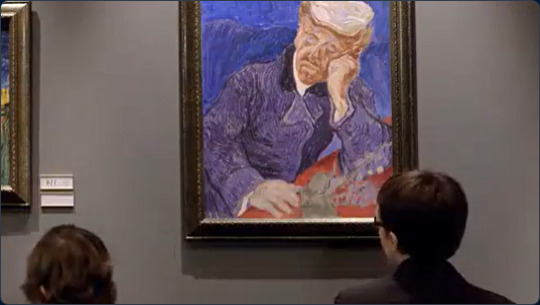
Contrast this with Bill Nighy's character, Dr. Black, fanboying over Vincent, and we get the rest of this story explained to us. This is also a story about how the world sees Vincent.
Then we get Vincent's actual introduction, the point where our protagonists meet, and it is... understated.
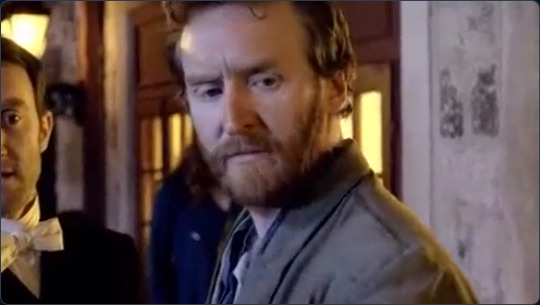
There's no ceremony about it, it just happens quietly. But there's something about Vincent's actions that I want to point out. He refuses help.
"You don't know three things. One, I pay for my own drinks thank you. Two, nobody ever buys any of my paintings or they'll be laughed out of town, so if you want to stay in town, I suggest you keep your cash to yourself. And three, your friend's cute."
I cannot understate how phenomenal of a line this is. It establishes lore, of course, but it also establishes Vincent's personality. This is a man who is down on his luck but cannot accept help. This is a man who is spiralling but refuses to be defended, justifying it as protecting someone else's honour.
At this point, the world sees Vincent in the same way he sees himself. He's mad, and an awful artist.

But I know what scene you are waiting for me to mention. So here it is. Vincent in the gallery. That panoramic shot and the conversation with Bill Nighy.
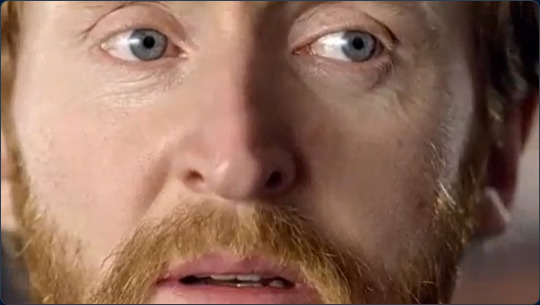
And again, its understated. On the surface of it, this is boring. Its just Vincent's face and some paintings and some sweet music. Bill Nighy doesn't even say anything we haven't heard him say before in this same episode. So why is it so influential?
Of course, one highlight is Tonny Curran's acting and how the camera frames it. In a story like this, the best special effect you can have is just a close-up of an actor earning their paycheck and then some. There is no loud weeping or ugly crying, this is so subtle, and so masterfully acted.
The other significant element is the context. I mentioned earlier that this episode is the contrast between how Vincent and the world saw each other. And up until now, Vincent and the world have been on the same page, but it's only here that the two views differ so much. Finally, Vincent is in a world where people unironically love his creations, where someone can fanboy over him without a care of being chased off, that's why this has such an effect. Not because of what it says, but because of what it does.
But there's one more scene that I want to mention.
Vincent still commits suicide. They don't save him. I don't need to explain why that is heart-wrenching. But this final scene unpacks that and presents the following idea:
"Every life is a pile of good things and bad things. The good things don't always soften the bad things, but vice versa the bad things don't necessarily spoil the good things or make them unimportant."
No, they didn't save Vincent. You can't do that in 45 minutes. But they did make a difference. They gave a man in pain some respite hope for the future, they made his life just that little bit better. And that's all anyone can ask to do.

#rants#character analysis#literary analysis#literature analysis#vincent van gogh#doctor who#11th doctor#vincent and the doctor#meta#meta analysis
76 notes
·
View notes
Text
WAKE UP BITCHES I HAVE ANOTHER OVERANAYLASIS ON RICK AND MORTY'S DYNAMIC
So, let's start with something everyone knows. Rick's relationship with Morty is toxic. Thats something we all know by now, right? I know it, you know it, we all know it. With their codependency, dangerous adventures, and Rick's continual emotional abuse.
I really think Morty knows that his relationship with Rick is toxic and abusive. Especially since Rick tells Morty as much in Forgetting Sharick Mortshall, and when he tells Morty this, Morty didn't appear particularly shocked. So it's possible that he knew about this even before then.
Rick: What we had was abusive don't you see? (...)
Morty: Ok...? So? What's the undercut?
He definitely knows what he has with Rick isn't healthy, but he's unable to leave. Mostly due to codependency, cause while Rick is more so codependent than Morty is, Morty definitely is codependent as well, partly because Rick is his first and only friend. But another reason why is because he knows that he's responsible for Rick's well being. Even though nobody should be responsible for anyone's well being, especially not a 14 year old boy. Rick very much relies on Morty for many things. Even basic things that Rick should do himself like getting food. This, while annoying, is admittedly small, but then it progresses to very heavy things nobody should put on anyone, like keeping him emotionally stable.
I do believe Morty on some level at least, knows this. Due to Morty having to put his life on the line in "Fear No Mort" to save hole Rick (Although Morty thought Rick was real) from his "hole wife". Morty point blank says "I just had to crucify myself to save you from your hole wife!" We also see this earlier in Unmortricken. In the episode Evil Morty says "What happens if Rick actually kills this guy? You ever think about that? Maybe he'll kill himself next." And Morty doesn't even deny he just responds "You're an asshole!" While Morty acts like this didn't have an effect on him, we see that it did have an effect on him, look at the first thing he asks Rick when he kills Rick Prime.

You can also see his lip quivering before Rick says "Yeah." And when Rick does say that he's ok (Lying old man) Morty immediately feels relief and hugs him. While apart of it is definitely codependency, he does feel genuine love for Rick and doesn't want anything bad to happen to him, and because of that Morty knows that he has to stay. We see how much Rick was affected by Morty leaving in Rest and Ricklaxation when him and Jessica talk (We need more of them as a duo btw, they were iconic)
Rick: She kept coming to our house, Morty and asking "Did y- Did you get a new Morty yet?!"
Jessica: Because you kept drunk dialing me and crying about it!
So Morty knows that his presence has a huge impact on Rick's stability which is way unfair but yeah.
So even if Morty got over his codependency, he's still stuck between a rock and a hard place, his choices are to either stay in this relationship that he knows is toxic at the cost of his mental health, or he could leave.
But he can't leave, because he knows what Rick will do if he does. But he shouldn't stay in this toxic relationship since it takes a toll on his mental health.
This poor boy really has no way out unless he stops caring about Rick, but the codependency and trauma bond combined with Morty's low self esteem (Courtesy of Rick) and every traumatizing thing Rick puts him through, it makes it damn near impossible for Morty to stop caring about Rick, even if Rick does something especially horrible, it's hard for me to believe that even that would be enough for Morty to stop caring about Rick.
And even then, if Morty somehow manages to stop caring about Rick and decides to leave, where will he go?
He has no support system. He doesn't have any family members that don't live with Rick besides Jerry's parents, and even then they would probably just bring him back, and as mentioned before, Rick is his only friend.
So, with Morty already being in a tough situation, with no real way out, with it being damn-near impossible for him to leave, there's a very high possibility that Morty will stay trapped in his toxic dynamic forever if it never becomes healthy. His choices are basically to leave with no support system and risk Rick killing himself, or to stay and let this toxic relationship continually deteriote at him and his mental health. My poor sweet innocent baby.
20 notes
·
View notes
Text
Only Friends Character Rankings Episode 5

It's The Date Episode! And honestly, fucking outstanding. The core six pair off and spend the day lying to themselves and each other. It's mostly cute and sweet but the undercurrent of shit about to hit the fan hangs over the entire episode. It's sort of the calm before the storm. Last week, Boston held onto his top spot in the viewer rankings for the second week in a row, with Ray and Nick rounding out the leaderboard. Can the most miserable bastard in the world do the hattrick? Here's this week's winners and losers.
🔺1. Top (2)
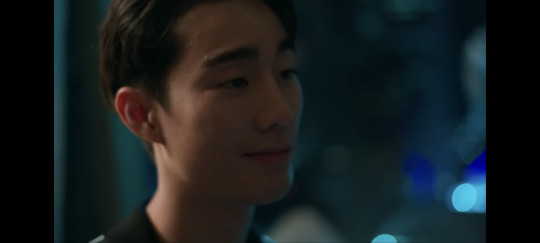
Why don’t you try Lasik? A friend of mine had it, and they said their eyesight is so much better. But now that I think about it…I don’t want you to get it now. I like you better looking like a nerd.
Look, ain't nobody more surprised than me, but this man legit got every goddamn thing he wanted this ep. Top putting on the perfect man act (and I am more convinced than EVER that it's an act) was fascinating to watch. Studiously ignoring all the various signals put out by various other men all day, knowing Mew's eyes are on him. The fucking INSTAGRAM COUPLE PHOTO. And then the knockout blow: when he looked Mew dead in the eye and said 'I love you' I said out loud OH YOU MANIPULATIVE MOTHERFUCKER WELL PLAYED. Do I think Top has bad motives towards Mew, no. I just think he likes the idea of Mew a lot more than he actually likes Mew. And now that Mew's given up that bussy, I'm counting down to Top finding a mistress to give him some variety.
🔺2. Nick (3)
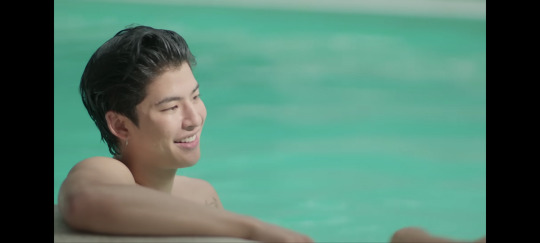
-You’re acting weird. -Weird how? I’m just… I’m just shuffling up my style.
Speaking of getting everything you want, Nick looked like he won the lotto when Boston started talking about settling down. Never mind that Nick is doing ALL of Boston's work for him. Never mind that 3 separate people have now told Nick that Boston ain't shit. Nick is euphoric. Nick has ascended. Nick is doodling 'Mr. Nick Boston's-last-name' in his Trapper Keeper. Nick is going to the gym and dressing more upscale. Nick is giggling when Boston asks to spend the night instead of fucking off as soon as they finish fucking. Nick is headed for a crash so great I'm SALIVATING.
🔺3. Boston (6)
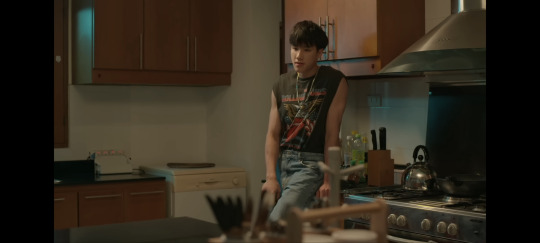
I feel like I should stop sleeping around for a bit. It’s been feeling so empty lately. In the end, I want to have sex with someone I can… talk to for a little, you know? Like, have great sex, have good chats, and…someone I can get affectionate with. Right now…there’s only you.
Told y'all you can't keep a bad bitch down for long and Boston's already bouncing back. He might have had a moment of weakness and tried to be nice for exactly one day, but Nick getting drunk and stoned and running his mouth about how cute Sand and Ray were activated his asshole glands. He smelled happiness and said NOT ONE FUCK OF THAT ON MY WATCH. Boston is that Marie Kondo gif, he fucking LOVES mess no matter how much he goes on about hating drama. He will always poke the hornet's nest. Shutting the fuck up was free, but he just COULDN'T. And thank god, because Ray punching him in the mouth was like 3 of the 5 top things that happened this ep.
🔻4. Ray (1)
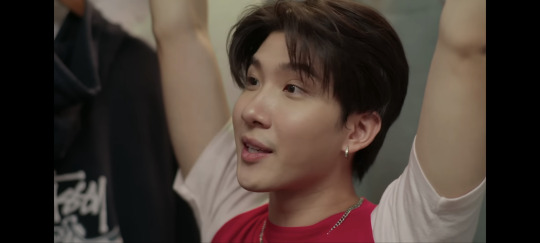
-That’s a nice top. Where did you get it? -This thing? It’s secondhand.
Whew Ray's day slummin' it was so classic I shed a tear. I can't really adequately describe his facial expression through the whole day, but 'condescending amusement' is closest. His enjoyment of Sand's company is very real, as are his attraction and hints of affection, but he absolutely does not consider that man his equal, and that's why he doesn't even consider the 'boyfriend' label. No matter what Ray's feeling, Sand's demi-monde, not part of his world. He likes that Sand treats him like he's special, he likes that Sand seems to always want him around, he likes that Sand will take care of him, but he'll never take Sand seriously. This would be true even if he wasn't in love with Mew, but being in love with Mew makes it all worse. Pathetic, I love it.
🔹5. Sand (5)
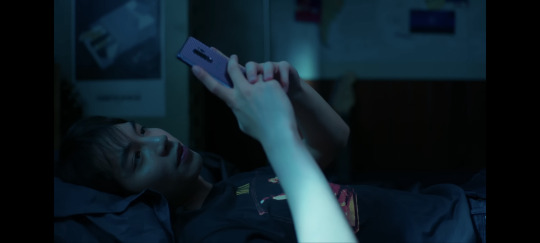
I work. I save up money. I sleep. I dream. I go to bed alone, wake up, and go to work. Until…he came along. It’s like somebody presses pause on all my 24 hours. Next thing I know…I’m living my 25th hour. Ray’s extra hour.
Oh SAND. I've been saying from jump this is hurting most because SAND KNOWS BETTER. When Sand called Ray his 25th hour I wanted to SCREAM because BABY BOY YOU KNOW BETTER. This dude is either drunk or hungover all of those same 24 hours you are grinding out a living, but you wanna spend your birthday with him because he makes you feel sparkly. He stays sneering at how you ain't got no money and work 17 jobs, but because he does it with a twinkle in his eyes you're blind and deaf all of a sudden. He told you HIS MOTHER DRANK HERSELF TO DEATH and you pour him another drink. I ain't feeling sorry for Sand anymore, he did this to himself.
🔻6. Mew (4)
-Does this mean I passed your test? -Yeah. You’ve convinced me that you really only have eyes for me.
Mew really tried to play a player and ended up playing himself instead. Like, in one way he's won: Top's his boyfriend, and honestly very likely to stay that way. But Mew should have been careful what he wished for because 'boyfriend' and 'faithful lover' are two very different things.
⭐7. Sand's mom

You keep nagging at me, you know that? Who between us is the mother, exactly?
WE AIN'T MET THIS LADY FOR NOTHING! My Sand/Top half brothers theory LIVES!
⭐8. Summer

Sorry to chat you up, but I’m alone, after all.
Poor girl's a hottie but didn't stand a chance.
#only friends the series#bless this mess#only friends weekly character rankings#i support gay wrongs#only friends#only friends series#bl meta series
69 notes
·
View notes
Text
Umineko Liveblog: Thoughts/Theories [Episode 1 Chapter 11 Edition]
Umineko chapter 11 served, primarily, as a space to breathe after the high-intensity horror of chapter 10. Nobody died. Nothing drastic went down. It was a quiet chapter, built to encourage you to contemplate on everything that has happened and everything that is still to come.
That does not mean that nothing happened within chapter 11. Despite its toned-down vibe and pacing, plenty unfolded within this chapter to think on. New character developments, new mysteries, and new clues pointing towards the shape of the bigger overall picture.
So, today’s writeup will explore the following topics: Beatrice’s witch narrative as a conscious performance with a conscious audience, Genji’s suspicious proximity to everything that has happened thus far, Kinzo’s vanishing act, how horror and mystery relate to the Detective/Romantic dichotomy, the Ushiromiya hierarchy being the biggest obstacle to the truth, the magic circle and the elephant in the room, the salient conundrum brought up by the existence of a gun, and the relationship between common sense and magic.
Let’s go and rotate Rokkenjima in our minds for a little while and see what we can’t figure out.
1-11 is a bigger chapter with more components than you’d expect going in. The first thing I want to talk about, and the major element that overshadows most of this chapter (as is to be expected), is the witch narrative. For what is likely a whole bunch of reasons, someone is invested in inserting the shed murders, and every unpleasant thing that has gone down on Rokkenjima thus far, into the myth of Beatrice the Golden Witch.
For the purposes of this discussion, whether or not an actual Golden Witch is truly present during this sequence of events is irrelevant. What matters is that the suspicious parties on the island are fixedly returning everyone’s line of thought back to the occult as often as they can, generating a supernatural air through language and gestures rather than hard evidence. In other words, the Golden Witch is, at this stage at least, a complete and total performance.
Hideyoshi, our suspicious man of the hour, continues to very insistently call everything unsettling he sees “demonic”. He does not think about the clues, nor does he permit anybody else to think about the clues. The blood in the dining room is foul and scary and unexplainable, therefore everybody should leave before the demonic foulness follows them. This is, of course, despite the fact that up until the deaths started happening he firmly did not believe in the story of Beatrice one iota.
Not only this, but whenever there is information that cannot be easily verified, Hideyoshi affirms it as truth. Nobody except for Genji and Kanon have checked the phonelines and the radio. Hideyoshi states unquestioningly that they are all therefore stranded with no way of contacting the outside world until the typhoon passes. You could merely argue that Hideyoshi is foolishly trusting even where it’s unwise to do so, but there is an inherent and immediate contradiction in his behaviour: he is fully in on Eva’s schemes and subterfuge, and has worked with her to try and get one up on Krauss.
Why am I bringing Hideyoshi up specifically? One of his major character traits we’re introduced to right at the start of the story is that when he is engaging with the business world, Hideyoshi affects a Kansai accent. In other words, Hideyoshi constructs a performance to conjure the illusion of a man that “exists” in order to get what he wants through what he says and how he says it.
How much difference is there, really, between Hideyoshi’s pretend accent in business meetings, and Hideyoshi’s frantic panicking about witches and demons during crime scene investigations? It’s all performative. It’s all scripted. As always, Beatrice “exists”.
This can be seen further when you examine Maria’s actions during this chapter. She spends the bulk of it pointedly ignoring everyone in favour of watching cartoons on television. The performative fictional story on her screen interests her more than the legitimate tragedy unfolding around her. This is likely not some newly-seen quirk of Maria’s; she is actually normally rather astute and present in situations that are disturbing and upsetting. She engaged with Kumasawa’s tale of omens on the boat. She is aware of the dread that comes with her rose vanishing. She is present for her mother’s beating of her. These are all very real things with very real impacts on Maria. And yet, she doesn’t bat an eye at the very real and very grim tragedy until she gets to infodump about magic circles.
I do not necessarily think this is all conscious on Maria’s part, and is more a thematic point being expressed through Maria’s character than anything else. I think the salient connection between Hideyoshi’s business affect and his sudden insistence on the witch narrative and Maria treating the tragedy with the same level of interest as she would a cartoon all point towards the same thing: the occult witch side of things is an augmented fiction brought to life, a method-acting stageplay that must be acted out for a variety of reasons both known and unknown. Maria, the child who only likes what she likes, is bored by the theatrics right up until she gets to play her role. The rest is just set dressing. Noise to make you believe.
Of course, it’s worth pointing out that the people we see inviting the witch narrative into “existence” are actors in this fiction, rather than the director. Hideyoshi is acting on direction. Maria is not acting on direction, but she is responding to carefully selected stimuli. If we only stick with them, we will likely not get any closer to figuring out what’s actually going on with all this. What we need is to find out who is the author of the witch narrative. Who is the one writing Beatrice into “existence”?
There are possibilities, but nothing concrete yet. However, merely by positing the existence of a conscious author of this fiction, this also forces you to consider the other half of this equation: a fiction needs an audience. Somebody needs to be witnessing this piece of theatre. There is somebody that this writer wants to tell their story to. The author is obscured. The why is obscured. But perhaps the audience is not.
Of all the people on Rokkenjima, there is one who sticks out the most obviously: Battler. He has been removed from this family for over half a decade. He is only barely starting to reconnect with his relatives, most of whom he has a distant and inaccurate impression of based on a resentful memory. To an outsider who is not privy to the way Battler thinks, it would be the most natural thing in the world to assume he still harbours resentment or indifference towards the rest of the Ushiromiya family. In other words, of all the people on Rokkenjima, he is the least likely to be seriously affected by the murders going by this logic.
If you were crafting a supernatural murder mystery tinged with so much tragedy, wouldn’t someone like Battler be an ideal candidate on paper? If you’re making a detective story, you need a Detective to go along with it, or it’s all for nothing.
However, the above statement relies on assumptions that aren’t water-tight. We do not know if the orchestrator of the witch narrative is consciously crafting a mystery, or if it’s just a by-product of the supernatural horror. We also do not know what the narrator wants from their audience, exactly. How much of what Battler is doing is what the culprit intends for Battler to do? How on-track is the witch narrative?
To answer this, we need to consider perspective and genre, and the all-important Detective/Romantic dichotomy.
Luckily for us, there is a scene in this chapter that directly talks about this stuff. When Battler is on the brink of starting to buy into the witch narrative, he has a kind of psychic heart-to-heart with brain ghosts of Rudolf and Kyrie that motivate him to continue to deny the existence of a witch. Rudolf discusses the horror genre, landing on the conclusion that horror exists to fabricate sensations for humans to experience in order to liven up their dull lives. Kyrie discusses chessboard thinking again, highlighting that the deeper you go into a game, the easier it gets to read the opponent as the number of potential moves shrinks to its absolute minimum.
In combination, these two epiphanies bring Battler into a Detective’s mindset where he is more willing than ever to both solve the mystery and deny that the witch exists. Given that Battler has this moment of introspection as a result of the stimuli provided by the witch narrative, it makes it easy to argue in favour of the witch narrative constructing a Detective story.
If that were the case, then everything is being laid out in-universe like a solvable mystery, just as it is to an external reader of Umineko. Somebody on Rokkenjima is expected to examine this mystery with a clear head and solve it. Battler, if Battler is the intended audience, is expected to be the Detective, to cut through the illusions by design.
Where this theory falls apart, though, is that it contradicts the nature of every person capable of perpetuating the Beatrice myth and the witch narrative. Would Kanon, in his determined desperation, want to get caught out and have his chances at escaping his circumstances ruined? Would Kumasawa spend so much time setting the stage at the start, reinforcing the existence of Beatrice in Maria’s mind, for the explicit purpose of having Battler tear it to shreds? Would the letter and graffiti be produced in such excruciating detail just to be denied? Would Eva and Hideyoshi ever consent to acting in a way that makes their crimes not only noticeable, but completely discoverable?
The witch narrative as a Detective story theory fails to marry up with the human element. The horror is not a conscious construction designed for humans to revel in its falsehood to feel better about themselves, because the stakes are too high for anybody to produce a performance that contradictory.
So instead, let’s consider the counter-fact: the witch narrative as a Romantic story. Returning to Rudolf’s horror metaphor, he misses out the crucial aspect of the genre, which is the way that the existence, or “existence”, of the monsters happens when the human audience is exposed to enough narrative material that they themselves conjure their own version of the monster in their minds. The true horror of the genre comes when something sticks with you even after you finish the story, something you cannot rationally deny no matter how much logic you throw at it.
To fit the witch narrative through this Romantic-horror lens, the express purpose of creating the illusion is to get the audience to fully believe in the existence of the witch. No matter what logic, no matter what reasoning, even if you don’t like it, you still can’t doubt your way out of acknowledging it. Through an overloading assault of occult tropes, at least something is bound to stick.
And indeed, Battler wavers for just a moment. It is only after his moment that he flips the script, and would from now on be acting against the way that the originator of the witch narrative likely intended him to. If you’re making a Romantic story, you need your reader to approach it from a Romantic’s perspective. If your reader is set on hard-denying you Detective style, then that’s an irreparable wrench in your plans. Perhaps this is the case. Perhaps the author misjudged Battler’s character, and their scheme is going to come crashing down around them.
That said, what if that’s not entirely the case? What if Battler, no matter how much he leans into his mystery-solving logic, is still acting from the place of the Romantic? After all, he is not coldly and methodically approaching this mystery. Everything he does comes from a deeply emotive place, from an untold sympathy and compassion for his murdered family members. He is not approaching this entirely clear-headed and objective. He is furious that his loved ones have been taken from him. Love is the ruling emotion of the day, not curiosity.
Further than that, the nature of Battler’s epiphany contradicts its own conclusions. He reaches his new perspective by going into his mind and conjuring versions of Rudolf and Kyrie that impart on him the emotional truths he needs to feel validated in continuing to doubt. He does not rely on his own reasoning, on facts and logic, but the memories of his loved ones that are real enough to change his outlook. What is the difference between brain ghost Kyrie telling Battler to remember that the act of cornering is a mutual one so the truth is easier than ever to grasp, and “Beatrice” announcing her impeding and impossible revival through letters and graffiti and the terrified behaviour of deeply compromised individuals?
The emotional truths hinge around words issued by people that “exist”. Everybody involved is invested in having their story uncritically believed. The culprit needs the illusion of the witch to get away with their crimes unscathed. The story of Beatrice is a powerful obfuscation of the material truth, something so overpowering and scary that you can’t fully deny it no matter what you do. Through and through, the witch narrative is Romantic.
So, if Battler is a Romantic masquerading as a Detective, what will happen when he runs against something he can’t deny completely and unequivocally? One major crux of the witch narrative is that it allows a convenient excuse for you to put all the suspicion and doubt on somebody who isn’t a member of the Ushiromiya family. Believing in Beatrice is to uphold the innocence of every human being on Rokkenjima. For Battler, who deeply cares about his family despite having every means to not do so, at what point would the allure of the abdication of blame become too strong to resist?
In his own words, Rokkenjima entered a “different world” the minute the letter was read out. How much would you really want to leave that world when the deeper you go into it, the more painful it will be to leave? Six people are dead. If a witch didn’t do it, somebody Battler knows and cares about killed other people he knows and cares about.
If you follow this through, Battler’s “role” in the narrative is to question right up until it becomes too painful to do so. What value is a truth that can only harm you? If Battler was a Detective, he may be inclined to seek it out anyway. But Battler isn’t really a Detective, so would he really seek to tear down the illusion even knowing what it would cost? Either way, if someone assuming the role of Detective gives up, that solidifies the illusion and removes room for doubt stronger than anything any singular occult symbol could ever do.
Both the Detective and Romantic reads of the witch narrative are plausible and have basis in reality. Both have their gaping flaw, all of which hinge around understanding of the people involved in this story. If you take the Detective’s read, you must have therefore misunderstood the motive of every person linked to the crime. If you take the Romantic’s, you must have therefore misunderstood Battler.
Either way, the common theme is that there is somebody not being understood in this whole performance. The two easiest to reach interpretations condemn the actors and the audience, respectively. Neither scenario, however, touches on the role of the writer, the orchestrator in the shadows.
Who is this person, deciding to produce the witch narrative? What do they want? Why do they want it?
If you could, even a little, fill in the obfuscating negative space surrounding the person behind Beatrice, that might be the thing to set you on the path to uncovering the real truth. Neither Detective nor Romantic, but a secret third thing.
Of course, this line of thinking asks you to consider something outside of the common sense frameworks being built up by Umineko all around you. That the story’s internal logic can only get you so far, and that there’s something additional you need to perceive, or at least perceive the outline of, in order to make more headway.
I am talking about the deeper mysteries of the text of course, but I am also talking about magic.
There’ve been several explanations of the way magic functions within Umineko thus far: it’s a convenient lie to pave over an uncomfortable truth (if a witch made the gold appear with magic, then Kinzo did not acquire it in any kind of evil way), an expression of dreams and desire (to Maria, magic is the one thing that brings her joy), an obfuscating wedge that influences reality against everyone’s wishes (the letter inspires murder even though nobody actively believes in “Beatrice”, so is that not in itself an act of magic?). Above all else, magic is a creative force that can shape the material world from an immaterial stance.
In other words, magic by nature denies and defies common sense and the common sense systems inhabited by most people. Battler struggles with this frequently in this chapter; the witch narrative is neatly set up for him to buy into, but he keeps hesitating because every single part of it goes against common sense. In the physical world, witches cannot exist to instigate a violent summoning ritual. People can’t be killed in impossible and occult ways. Everything must have a mundane explanation. You can think your way out of any problem.
And yet. Battler said it himself. The minute that letter was read out, Rokkenjima entered into another world. Nothing has changed, yet everything has changed. Maria’s rose was there, and yet it was not. Beatrice “exists”.
In every case, the same thing happens. The imaginative rule of thought overrides critical logic. Magic happens when you cannot doubt. Like a good fiction, the illusion only works if you can suspend your disbelief enough to let it manifest. If you read a story with a pedantic frame of mind, picking apart at the very structural seams of the thing until meaning itself unravels, you destroy the magic root and stem.
For instance, I can destroy the illusion of Umineko myself right now. I am merely spending time looking at a collection of png images overlaid atop each other, accompanied by text and audio files. There is not a temporal continuity in this story; each “scene” is a disconnected fragment of information with no actual connective tissue between it and the next. The onus is on me to “believe” that the space between chapter 1 and chapter 2 proves the world of Rokkenjima to be “real”, even though in reality I am shown two disjointed moments – one where Battler (Battler himself being a collection of symbols I am choosing to buy into until it resembles a person in my consciousness) is screaming inside a plane (a loud voice recording plays alongside a drawing of a plane’s interior), and then another where Battler is in the airport on the other side.
The plane journey never existed in narrative, and yet it “exists” in my perception of the story. It becomes more real when the other characters discuss how Battler behaved on this flight. It becomes impossible to deny the plane journey illusion.
If I wanted to, I could still hold fast to the objective truth that the flight never took place, but I ultimately choose to buy into it anyway, because I want to believe in the structural integrity of Umineko. I want to read and engage with Umineko, so Umineko becomes real and engaging enough for me to do that. If you call this nebulous imaginative process “magic”, then magic therefore unequivocally exists, because without imagination/magic, there is no meaning-construction to be done.
Like fiction, like magic, the contradiction lies in the fact that in order to engage with a world, you must therefore suspend your common sense in order to grant it the fullest “existence” that you can. This is a very pedantic ontological point, I’m aware, but is not magic itself also a pedantic ontological point?
The important takeaway remains that too much “common sense”, too much reliance on logic, too much Detective, kills the magic dead. And unless you consciously choose to conjure it up again (such is the case when the reader of a story deconstructs it to language then reconstructs it to narrative) it will stay dead no matter how much the author/witch tries otherwise. Therefore, it’s in the best interest of the author/witch to keep their audience from denying their narrative. It would be bad for business if everyone became a skeptic.
Which is why it is very curious but also completely unsurprising that the narrative of Umineko itself is insistent on maintaining the illusion. Whenever Battler is not telling the story, we are constantly treated to passages and phrases that are all permutations of “it was impossible to figure out, so everybody stopped thinking”. Given that the reader’s instinct is to distrust a first-person narrator as unreliable, and Battler is the element of the story dedicated to denying the witch narrative, it is surely a little suspicious that the more “reliable” third-person narration likes to make a point of passively encouraging acceptance of the witch narrative in this way.
The most compelling evidence for the witch narrative only comes through the third person narration when Battler isn’t there to question or deny it. Battler doesn’t get to see the magic circle on the storehouse door. Battler doesn’t get to see the butterfly that haunted Shannon in her final moments. The only thing Battler gets to see is the letter being read out by Maria, the significance of which is impossible to deny even for him, even if he claims a witch had nothing to do with it. Everything that most strongly affirms the illusion of Beatrice is shown outside of Battler.
A cynical read would be to claim that this is proof the magic is bogus, because under Battler’s scrutiny it would all fall apart as the sham it really is. But as outlined earlier, magic is inexorably tied to the human capacity for imaginatively sequencing reality. If magic didn’t exist, then a whole bunch of other crucial things would also by definition not exist.
So the takeaway is that we are supposed to treat the signs of the witch narrative with gravitas and seriousness. The opening summary for episode one states that our goal here is to not think too hard about what happens and accept all that we see. This directive is not given to Battler or anybody else on Rokkenjima. This directive is given to us before we even start reading the story.
It is important that, at least for now, we accept the witch narrative as something to genuinely engage with, and not as an inconsistency to be torn apart. Destroying the illusion without gaining any understanding would defeat the purpose of whatever the narration is really trying to do – like I’ve discussed before, it is highly likely that the narrator of Umineko has a specific purpose and agenda in presenting this story the way it is presented. There is some kind of truth that needs to be reached, but that can only be reached by entertaining the witch narrative as being real.
Whatever the truth of Umineko is, it cannot be reached through common sense. It cannot be reached by outright denying magic. Even if the truth itself is not magic, a rejection of magic will keep you from it. We would be failing as readers if we were to, like Battler, automatically assume the magic is meaningless without a second thought. Just as within the story “Beatrice” needs the Ushiromiya family not to deny the witch narrative, so too does the narrator need the external audience outside of the story not to deny the witch narrative. We all need to remain at least partially convinced, because doubt is the death of a story, and too much doubt would not only tear apart the witch, but also Umineko itself. The illusion is important for everything to function as it should.
So let’s now turn our attention to one of the cornerstones of this generated narrative illusion: the magic circle. This piece of graffiti becomes a talking point as Hideyoshi and Nanjo bring it up to the rest of the family, in tandem with Battler puzzling over the purpose of using it to advertise the location of the bodies.
Once brought up, Hideyoshi and Nanjo describe the appearance of the magic circle to Maria, who confirms it as a legitimate occult symbol. Based only off their uncertain descriptions, Maria still manages to draw a perfect replica of what they saw, and then goes on to define its meaning: a sacrificial symbol to grant freedom from inescapable bonds.
Through this exchange, some facts about this magic circle can be established. Regardless of whatever was physically painted on the shutter door, the conceptual idea of the symbol is authentic and verifiable. Somebody has deliberately introduced the notion of this sacrificial circle, and made sure that legitimate information would be conveyed to Maria, who would then in turn grant it a sense of truth that nobody else could. It is a simple and powerful way of strengthening the witch narrative: after all, who would go to the lengths to produce such a perfect symbol if it didn’t have meaning?
What is worth pointing out, however, is that the message and purpose of this magic circle in no way fit with the other actions and motives of the “Beatrice” narrative. The letter and the actual killings indicate that the intended pattern is for everything to line up with the ritual established in the epitaph – these are the six chosen by the key to set the ball rolling on the Golden Witch’s resurrection. The magic circle should be irrelevant; by all measures, the six bodies themselves are where the power comes from. The first twilight makes no mention of a sigil, or that anything has to be done beyond the sacrifice of the six.
The magic circle is theatre, then. Its purpose is not truly occult, but instead to heighten a sense of belief in the occult. To somebody unfamiliar with the epitaph and its implications (which is almost certainly pretty much everybody there), the appearance of six mutilated bodies on their own would not induce any kind of supernatural paranoia. It would be a grisly and terrifying scene, but without the over-the-top iconography, the witch narrative would not manifest.
Like Battler surmises, the culprit wanted the circle to be seen. He lands on it being a flashy way to advertise the location of the corpses, which is true enough, but is likely only one part of the reason why. The purpose of the circle is to catch the attention of the oblivious, so that they are forced to acknowledge what is going on. This includes both the murders, and the narrative of the witch. Both these things need to happen in order for events to progress, for whatever reason. Battler considers that the circle may be a message intended for Kinzo’s eyes, but the opposite is most likely true. This circle was drawn for the benefit of everybody except for Kinzo.
And of course, if the circle is to be treated as a narrative entity, then it’s important to examine the storytellers. The ones who fill everybody in on the details of the circle are Nanjo and Hideyoshi. Hideyoshi at this point is pretty evidently entrenched in upholding the witch narrative, but it is also curious that Nanjo is one of the originators of information about the magic circle as well.
Throughout the story so far, I’ve kept flip-flopping on whether or not Nanjo is to be suspected, or if he is unfortunate enough to be incompetent at the worst possible time. What’s worth considering about Nanjo is that while he has performed suspect activities (confirming the details of the magic circle, encouraging everybody to stop looking at the crime scenes), he is not outright perpetuating the witch narrative in the way Hideyoshi has been. Nanjo never describes anything as demonic, as inexplicable. He just describes it in a matter of fact, albeit disturbed, manner.
Hideyoshi being in on the witch narrative makes sense. He is almost certainly embroiled in whatever went down when the six were actually killed. Nanjo occupies a weirder space. He very conveniently presents things in a way that would benefit the witch narrative without ever being an outright suspect himself. He has no connection to the inheritance dispute. He is not trapped in the desperate cycles of torment that the other servants are. He has not been seen to interact with any suspicious element in the story. He is just there. And yet. And yet.
That said, there is one suspicious thing Nanjo does do in this chapter, even if it is suspicious in a way that isn’t directly related to either the murders or the witch narrative. When the possible meanings of the magic circle are brought up, everybody’s attention turns to the iron cross situated front and centre. Nanjo is the one that brings up that the symbol is best known for its usage by an ancient religious order, which leads the others to latch onto that theory until Maria outlines the actual occult meaning of it.
What’s interesting here is that the other meaning associated with the iron cross goes unremarked upon. I don’t believe this is because that meaning is irrelevant in Umineko – in the previous chapter, the iron cross was distinctly described as looking “European” – so it is worth considering why this meaning is never brought up. Nanjo knows enough about the history of the iron cross to discuss its ancient religious meaning, but he doesn’t talk about its usage as a fascist icon?
Assuming Nanjo is aware of that meaning, and is not saying it, this would not be the first time that he has spoken over what should otherwise be an elephant in the room. Right at the start of the story, when discussing a will with Kinzo, Nanjo very overtly hinted towards Kinzo using a will as a means of confessing some kind of sin, being as explicit as he could be without directly stating whatever said sin is. Kinzo denied that he had any such skeletons in his closet, before pivoting to talking about his one regret being that he never saw Beatrice’s smile again. Nanjo, however, still firmly made it clear that he believed in the existence of some great sin in Kinzo’s past that needs absolution, something that Nanjo never directly says out loud.
How likely is it, then, that Kinzo’s sin and the deliberately unspoken-on western fascist iconography are linked? Nanjo has known Kinzo for years, enough that he is one of the very few people that the man actually trusts. Could it be that, whatever this sin of Kinzo’s is, that Nanjo is in some way complicit? That he can’t talk about it, because talking about it himself is to admit an involvement he would rather not have anyone know about? Nanjo is very good at being an unremarkable, inoffensive presence. Perhaps it is a practised front, a means of self-preservation in the face of whatever murky thing lies in the past.
As the magic circle hints at, everybody on Rokkenjima is confined by an inescapable obligation. What obligation holds Nanjo there? Unlike the family members and the servants, Nanjo is simply a physician. Nothing about him is personally bound to the Ushiromiya family. And yet he’s here, stuck same as the rest of them. What does Nanjo know? There has to be something, because of all the possible magic circles drawn, the one with this specific image was chosen. Somebody used this symbol to evoke that grim secret. Try as he likes to bury his head in the sand, I feel like sooner or later, this thing will come to light, either via confession or via the culprit forcing it out into the open.
I’ve already spoken on who I think is the best candidate to have produced this magic circle, and so far nothing has contradicted that theory. It still needs to be a person who has access to the occult knowledge who isn’t Kinzo, who had the means and opportunity to produce the circle. That still leaves the same two culprits as last time. Kanon by now is an established suspect, and there’s not much more I can say on him that I haven’t already said.
Instead, let’s turn our attention to the next most suspicious servant, who has a knack for being at the centre of a lot of bizarre and convenience coincidences. Let’s think about just how sus Genji really is.
I’ve already outlined in an earlier writeup how Genji makes the most sense to be an accomplice to Kanon if Kanon is the culprit. This time I’d like to examine how Genji’s actions in this chapter paint him as even more suspect.
The obvious thing to mention here is how easily Genji could get away with lying. In this chapter, Genji confirms to everybody that the phones and radio are down, leaving them with no way to contact the outside world. This claim is bolstered by Hideyoshi immediately reacting with utmost belief. Nobody else has any room or reason to doubt what Genji is saying. Genji says something, a person parroting the witch narrative reinforces it, and it becomes hard fact.
Meanwhile, not once have the phones and radio been inspected by anyone other than Genji. In this way, his claims are even flimsier than narrative evidence located in non-Battler POV segments. Whereas with those, we the reader get to see something, even if that something is not true, here we get nothing except for Genji’s word. Genji, who is the closest ally of Kinzo, and would know him and his quirks enough to justifiably have a passing understanding of occult concepts. Genji, who knows Beatrice. Genji, who is strong and competent despite his advanced age.
Genji, who is at the centre of a lot of convenient coincidences. The phones and radio are broken? Who is in the best position to sabotage these things. Krauss’s personal boat is out for repairs and thus unavailable on the exact date of the conference? Who is best positioned to arrange such a set of circumstances. The bodies are found in a location only a servant with a key could access? Well, I sure do wonder who fits best there. In chapter 10, it was said that searching for fingerprints on the storehouse door would be useless because Kanon and Genji’s prints would already be on there from opening it up. Genji is present for both the magic circle in the garden and the bloodstains outside Natsuhi’s room. Genji is the one that greets Eva and Hideyoshi at midnight after they return to the guesthouse. It is always Genji, always present.
When you give it even a moment of scrutiny, Genji is right at the heart of the witch narrative, moreso than even Kanon. It would be impossible to deny Genji’s involvement at this point no matter which way you slice it. There are too many instances of this happening to dismiss it as coincidence.
The only issue with trying to pin anything on Genji is that the question of why remains totally opaque. Genji has the means and opportunity to be a likely culprit, but why would he do that? All my other major suspects have a clear motive. Eva and Hideyoshi are either trying to save their own skin (if you want to be charitable) or gunning for the gold and the headship (if you want to be uncharitable). Kanon deeply loathes the Ushiromiya family and the way they’ve treated both him and Shannon and is acting from a place of desperation. Genji, however? Genji is in good standing with Kinzo. Genji has given no indication that he is either resentful of his position as a servant or interested in the gold. So what reason would Genji have for involving himself?
I’ve sketched it out before, but the only thing I can even vaguely think of is based on the way that Genji will say “I faithfully serve the master of the household”. This phrasing is interesting, because it can be taken to mean that Genji’s utmost loyalty is to whoever the head of the Ushiromiya household is, and not Kinzo specifically. Would this mean, then, that in a situation where Kinzo were to no longer act as the Ushiromiya head, Genji would switch allegiance to whoever took his place? If, say, Kanon were to find the discarded ring in the courtyard and use it to seal some letters, would that be enough for Kanon to become the new “master”?
If so, why would Genji act like this? He is one of three servants on Rokkenjima to refer to themselves as furniture, but unlike Shannon and Kanon, we are not ever shown any specific facet of abuse inflicted on Genji beyond the standard abuse inherent to being part of the servant class. Genji is the senior servant. He is Kinzo’s good friend. Natsuhi and Krauss distrust him, but they aren’t outright hostile to him. Nobody berates him. Nobody disrespects him. So why would this kind of blind servitude be a core part of his character?
The only thing I can think of to explain this in a way beyond “Genji is just like that”, is that Kinzo has indicated that the murders and the revival of the witch are only one half of his desired outcomes on the demon’s roulette. Kinzo’s understanding of magic is founded on the idea of getting a result with astronomically low odds in the face of infinitely more likely occurrences. With the epitaph, there are two outcomes: either thirteen people die and the witch is resurrected, or somebody solves the epitaph, finds the gold, and succeeds the headship. Both of these outcomes would be acceptable in Kinzo’s eyes.
Kinzo’s insurance for the murder part of the epitaph is well-outlined; he holes himself up in his study and waits for everyone else in his family to die so that he can meet Beatrice again at the end of it. What is less clear is his insurance for the succession part. It’s abundantly clear that he does not want his own relatives to solve the epitaph and claim the rewards (and there may be some contract word trickery where the fortune is safe if not in the hands of someone who is part of the Ushiromiya lineage) and has not so subtly pushed Kanon to think about solving the epitaph for himself.
I think my earlier theory that Kinzo is grooming the two young furniture servants to play specific roles in the epitaph ritual holds strongest here. Kanon solves the epitaph and becomes the new Ushiromiya head, thereby preserving Kinzo’s fortune in a way that keeps it out of the hands of his loathed offspring. Shannon, meanwhile, becomes a vessel for the Golden Witch’s spirit once the murders have finished. In Kinzo’s dream scenario, having Shannon and Kanon survive to the end would allow him to have his cake and eat it. Beatrice revives, and the fortune is preserved. Kanon and Shannon become the new Ushiromiya head and the new Golden Witch. The cycle repeats.
Of course, giving the headship to Kanon would be a risky bet. If even a single member of the Ushiromiya family survives, there is absolutely no way that Kanon would get a shred of anything. So the only way for this plan to work would be for either every single Ushiromiya to die, or for there to be some means of protecting Kanon’s status.
Genji deeply and fondly cares about Kinzo, enough that he can bring out a softer side to the man. If Kinzo were to frame this as a final request to an old friend, would Genji be likely to follow through with it? He cares about Kinzo, and he has a soft spot for Shannon and Kanon. I think it wouldn’t be a stretch to imagine he’d be willing to protect these kids on his master’s say. Genji has nothing to gain, but also nothing to lose. He is prime suspect material without even trying.
And better than that, Genji’s suspicious position continues to fulfil his duty of upholding the Ushiromiya hierarchy. Both Battler and Eva say it themselves; the easiest conclusion for anybody to reach is that the murders are the work of a servant with a grudge against the family. When the typhoon ends and the survivors leave, this is almost assuredly the story that will reach the police’s ears, because it’s easier than having to examine the rotten foundation present in the Ushiromiya family members themselves.
The unspoken element of this whole murder mystery setup is the class dynamic at play. The two groups of people on the island consist of the extremely wealthy family members, and the put-upon and abused servants. Almost immediately the most suspicious members of the family leverage this class discrepancy to plant seeds of paranoia towards the servants, relying on the fact that it’ll be easier to condemn them than their own relatives.
When Eva discusses with Battler that the most likely culprit is a servant (even if the evidence does indicate that) she is setting in motion that dilemma. Who can Battler distrust more easily? His beloved aunt, or a servant? Who would he rather send to prison by pointing the finger come the morning?
Of course, Battler tries to shoot Eva down through chessboard logic, claiming that pinning it on a servant is too easy and too obvious, that it’s the expected move to make when taking on a family of paranoid rich people. The truth would naturally be more complex than that, so Battler tries to puzzle out what that more complex truth might be. However, the evidence still paints the picture that only a servant could have given Maria the letter, that only a servant could have set up the storehouse scenario. When those facts become impossible to deny, what happens then?
The petty “servants seeking revenge” narrative is just as much a brute-force obfuscation as the witch narrative. In the face of such atrocities, it is easier to hand all responsibility over to a witch, or to the lesser servants, than it is to consider that your own relatives are complicit. Without the witch narrative in place, the servant narrative would easily win out. The Ushiromiya family would close ranks. They would convince themselves only a servant could have done it, and they would all as one state that a servant did do it. No thinking needed. All you’d need is the reliance on your place in the class hierarchy. Any suspect family members are protected by everybody taking the easy road.
By all accounts, this series of murders should do nothing to disrupt the cycles of abuse and violence in the Ushiromiya family. The wealth and class violence should ensure that no matter what, they will get away consequence-free. So what could actually manage to put an end to this rotten cycle, then?
This is where the witch narrative would shine. You cannot believe in both the witch narrative and the servant narrative. Believing in the witch also means ceasing to suspect the servants by virtue of its very construction. And more than that, if you consider that the witch narrative is using the murders to force everyone to consider a deeper truth than tricks and culprits, a successful witch narrative may very well destroy the Ushiromiya structure once and for all.
If the magic circle’s alternative symbolism has weight, if the implicit meaning is true, then the witch narrative will drag to light the Ushiromiya family’s dirty secrets. Here, it does not matter if the individuals in the family believe or not. What matters is that the witch narrative is painting a picture of the fascist core at the heart of Rokkenjima. In that case, what happens when, after the murders, word gets out that the Ushiromiya family is brimming with rotten politics? What does it mean for the world to know that this successful family is sitting atop a pile of illegal, possibly fascist, gold? It would be a PR disaster for every company associated with the family, worse even than money troubles. The very structures upholding this family would be used against them and they would be powerless to stop it.
Given how intrinsically woven the witch narrative is into the fabric of the murders, there is no way they could even attempt to cover it up without it also looking like they’re trying to cover up the murders of their family members. If they tried to bury the second truth to the killings, it would only serve to paint them as the culprits. In a roundabout way, this is a more material manifestation of the believe the witch/deny the witch dilemma. If Eva denies the witch narrative, she is suspected as a culprit. If she attempts to cover up the occult presentation of the crimes, she becomes suspected as a culprit. It’s the same thing on two different levels. A top-down conundrum that forces the Ushiromiya family to play along with the story for their own good.
And here, at the intersection of Ushiromiya hierarchy and unsolvable mysteries, we get the latest problem to solve: Kinzo’s disappearance.
After returning from the storehouse terrified and traumatised, Eva and Natsuhi take it on themselves to make sure that Kinzo, the only person still unaccounted for, is alive and well. Natsuhi out of a sense of fear and duty, Eva out of a sense of wanting to be proven right. Some time later, they return to the parlour with the grim news that the Ushiromiya family head has disappeared.
This is immediately an intriguing problem. The last time we saw Kinzo was in the morning, shortly before the discovery of the bodies. He was in his study, present enough to have his bizarre heart-to-heart with Natsuhi. Beyond this change in character (that is not without precedent), there was nothing up with Kinzo in this scene that would even imply something like this would happen.
Natsuhi met with Kinzo in the study at around 08:00. Chapter 11 starts at 08:45. Assuming some wriggle room, this gives a window of maybe one hour tops within which Kinzo can vanish. Drilling further, you can assume the time that Kinzo disappeared was most likely when everybody was finding the bodies, leaving the mansion empty save for Maria and maybe Kumasawa. That window would likely be shorter, perhaps no longer than thirty minutes.
So. Somehow, Kinzo manages to disappear without a trace, unassisted, in a span of half an hour. A timespan that also just so happens to coincide with the discovery of the six corpses. It’s a very weird and very convoluted setup.
The first questions to ask are: where did Kinzo go? And is he still alive?
In terms of location, this can be narrowed down considerably. Kinzo obviously was not in the garden or storehouse because this is where everybody was during the timeframe of his disappearance. Natsuhi and the servants later performed a sweep of the entire mansion, confirming that he was not there either. His study remains empty, so he is not there, either. That is pretty much every known place on Rokkenjima ruled out.
Except for one: the Golden Land. Or the vault. Or wherever it is the ten tons of gold ingots are hidden. If Kinzo is anywhere, it is likely he is here. It’s an impossible place that nobody will think to look for until it’s too late, requiring an engagement with the witch narrative to even stand a chance of locating him. Why would he go here, when it’s been established that his study is the safest place to be during a series of murders?
If he left of his own volition, which seems likely given that nobody could have feasibly helped or forced him, we need to consider his last actions before disappearing: his conversation with Natsuhi. Could something about that interaction have prompted him to move? Perhaps the fact that Natsuhi, a marked sacrifice, survived the night shook his confidence. If something that small can go awry, perhaps the demon’s roulette isn’t as guaranteed as he’d like it to be. So by heading to the “Golden Land” ahead of time, it means that he cannot be “sent” there as part of the ritual. Also, unlike his study which can be opened from the outside by a key, the only way to even find the hiding place of the gold, let alone access it, is to solve a nigh-impossible riddle that nobody has any interest in.
Except if you think about it, even that is rife with contradiction. In order to reach the gold, you likely need to complete all the steps of the epitaph riddle. Doing so would likely render the riddle unsolvable for anybody else thinking of trying their hand at it, defeating the purpose of the demon’s roulette. For Kinzo’s magic to manifest, he needs two equally viable extreme outcomes to pit themselves against each other. Why would he eliminate the resisting force that would guarantee his miracle? Something doesn’t add up.
And more than that. When discussing his disappearance, it is made abundantly clear to the reader that this is an extremely weird thing for Kinzo to do no matter what. His updated character status all but states outright that him ever leaving his study is completely and wildly out of character for him. Natsuhi and the servants make it very clear that, for some reason, it should be “impossible” for Kinzo to leave his study. And yet he is gone regardless.
Why would it be impossible for Kinzo to leave? He is not physically sealed inside the study; there is a locking mechanism from the inside that he can use to come and go if he so wanted to. All his needs are in theory met inside the study, so it’s not likely he would want to go out and interact with his family, but impossible? That’s a strong word. How and why would Kinzo be trapped in his study, in a way that makes it apparent to those who know him best that he would never leave?
It gets weirder, though. In the flow of this same conversation, after highlighting how impossible it would be for Kinzo to leave the study, Natsuhi offers an alternative explanation: Kinzo, on a fickle whim, likely decided to go out for a walk. Ignoring how ridiculous that is as an excuse, there is the more pressing issue here. How can it be impossible for Kinzo to leave his study, and yet also equally likely that he would simply wander around oblivious to the ongoing crisis?
How can Kinzo be both trapped in his study, and also capable of roaming around the mansion? Why would Natsuhi say such a thing?
Really, when everybody is acting like this, it’s no surprise that Eva is this confident in her conspiracy theory. Speaking of which, let’s address the second question related to Kinzo: is he still alive as of his disappearance?
I am not sure. I think that, either way, we won’t see Kinzo again until we discover his corpse, but as to when that will happen is a mystery. Logic dictates that he can’t be dead yet, because nothing about him fits the criteria for the next twilight. One old man dying on his own does not constitute “the two who are close” in any possible way.
He could fit the criteria for any twilight after the second, but if he’s an intended sacrifice, why take him ahead of time? If you kill somebody for, say, the fourth twilight before the second has even happened, doesn’t that invalidate the sequence of the ritual and prevent Beatrice’s resurrection?
This might make sense if Kinzo was abducted by somebody with a vested interest in stopping the ritual (but again, nobody was around to take him), except that raises another contradiction. If the culprit didn’t want the ritual, why ensure the killings match the first twilight, and why go to all these lengths to fabricate the witch narrative? If something sticks out like this, the whole thing will unravel, and as we’ve already established, the culprit needs the witch narrative to succeed for any of this to work.
So if all that is the case, why did Kinzo disappear? What for?
If he was taken to be killed, who took him? Where is he? If you assume my earlier theory of Kinzo being in the room with the gold, the culprit keeping him there to kill him once again contradicts the witch narrative: if the epitaph gets solved, the murders stop. If a body is found in a place where you need to solve the epitaph to access, it completely shreds every drop of legitimacy that a witch could be present.
How, then, can you reconcile Kinzo’s disappearance with the witch narrative? There is one thing I can think of, but a lot of it relies on baseless conjecture inspired by one singular detail.
After searching the mansion for Kinzo, Natsuhi returns carrying a gun. She claims to have taken it from Kinzo’s personal collection as a precautionary measure. The existence of this rifle immediately solves one mystery, and creates one more.
The bodies in the storehouse had their faces mutilated in a way that wasn’t clear. There was no tool found that could have done that to them. A rifle like the one Kinzo has would very conveniently blast a hole in someone’s face, tearing it up in a way that matches what Battler saw. This strongly indicates that the culprit, or the person who set up the first twilight anyhow, has access to a gun.
If you assume this as truth, another problem immediately arises. The gun was kept in Kinzo’s personal collection. The location of this collection is not specified, but based on everything we know, this gun was almost assuredly kept inside Kinzo’s study. This means that, in order to create the first twilight, the culprit had to take the gun from Kinzo’s study and use it.
(As an aside, even if you figure that there is more than one gun at play, all guns are likely stored in the same place, so the issue is not with the number of guns, but the location of Kinzo’s collection).
The list of people who could have taken the gun from the study that night is incredibly small – only Genji has a key to the study, and only he and Kanon would stand a chance of being granted entry. Luckily, it is very likely that Genji and Kanon are involved in the crime, so this fact holds water.
What doesn’t hold water is what this implies. There is no way for anybody to enter Kinzo’s study without Kinzo knowing. If Genji and/or Kanon took the gun to mutilate the bodies, Kinzo would also therefore be aware about the first twilight at around midnight. How likely is it that Kinzo would let them take the gun without at least asking questions? A spiteful old man like him would almost certainly want to know who died, if only to make sure it adheres to the pattern of the epitaph if nothing else.
So in this scenario, the servants take the gun, mutilate the bodies, and then either return it to the study or keep it for themselves depending on if there’s more than one gun. Either way, this means Kinzo has full knowledge of what has gone down. One could even argue that this makes him an accomplice to some extent.
Under this scenario, it might make sense for Kinzo to disappear from the study. Since Kanon and Genji were preoccupied with the bodies, the only way for Kinzo to vanish is to leave the study himself. Except the most likely culprits chosen by the demon’s roulette are all people who wouldn’t dare harm Kinzo (Genji is honour-bound, Eva killing Kinzo would contradict her ambitions to be recognised by him), so it is not like he would need to flee the study for somewhere safer. Nobody suspicious would actively target Kinzo, with maybe the exception of Kanon. But Kanon almost certainly cannot act on his own, so that’s a moot point.
And more than that, would a Kinzo who is fully aware of what has gone down act the way he acted towards Natsuhi in their conversation? He adamantly refuses to leave his study, telling Natsuhi that he does not want to hear even a single word of the other siblings discussing the inheritance. Would he act like this if he knew every single sibling except for Eva was dead? The night before, Kinzo had given himself fully to Beatrice and the demon’s roulette, ceasing to care about trivialities like the inheritance and the conference. Why would he suddenly care about this again? Odds are that even if he doesn’t know who’s dead, he should know that even one murder would stop the inheritance talk dead in its tracks. So why would he say this?
If Kinzo knows anything, his conversation with Natsuhi makes no sense. He would not say that. Not if he knew people were dead. Not if his gun had been taken. Even if he didn’t clue Natsuhi in on any of this, he would have received evidence that the ritual is happening, so he should have been even more off the “ohhhh Beatriceeee” deep end than normal. Instead he acts as if none of this Beatrice murder stuff is happening at all.
The two scenarios are not compatible. Either Kinzo does not know about the murders, or there’s something up with his talk with Natsuhi.
If Kinzo knows nothing, how was his gun used in the first twilight? If he knows something, why did he act like he did towards Natsuhi? Both cannot be true. And yet they seemingly are.
We have to assume the gun was used to mutilate the bodies, because there is nothing else shown to us that makes sense. For the gun to be used, that means somebody was in Kinzo’s study past midnight in order to obtain said gun. We also have to assume that fact to be true.
This places the contradiction squarely within his conversation with Natsuhi, then. Luckily, there’s already a basis for something weird going on in this scene even without the tangled psychic knot of his disappearance to contend with. Halfway through the conversation, for no reason, Kinzo’s entire personality pulls a complete 180, going from bitter and hateful to reassuring and praising Natsuhi as a worthy member of the family.
Kinzo’s actions in the latter half of the conversation are discussed by the narrative as if he’d become a “different person”. More specifically, it’s as if Kinzo transformed into the exact person Natsuhi needed him to be at that exact time. He says exactly what Natsuhi needs to hear in order to have the strength to face the rest of the family. This runs counter to the established loathing and abuse of Natsuhi we have been told about by Kumasawa. One explanation would be that he now respects Natsuhi for surviving the first twilight, but this is incompatible with the notion that Kinzo knows nothing about what went down outside of his study. This again goes back into the incompatibility between the gun being used and Natsuhi being reassured.
How can you explain this away?
I have one way, but it’s an insane reach that I’m not confident in, and relies on a very specific reading of Umineko to work.
Previously, I’ve discussed the way that scenes Battler isn’t present for are more interested in conveying the Romantic’s emotional truth than the Detective’s logical truth. My prior example was how the occult symbols aren’t seen by Battler, so their importance lies more in the way that the people who do see them react. I also argued that this makes the physical details of those things hard to concretely pin down, to the point where whether or not they physically exist does not matter. I also argued something similar in chapter 9, with regards to the very weird and disconnected framing of Shannon’s scenes, that some truth was either being hidden from us or being fabricated in the presentation of that chapter.
I never wanted to outright say it, because I think it’s a leap, but for this to work I’m going to argue that non-Battler scenes are fully capable of outright lying to us about everything seen within them. This would mean that we can trust nothing that happens outside of Battler’s vision except for the feelings and emotions inspired by what supposedly happens.
Let’s re-examine Natsuhi’s conversation only focusing on the emotional trajectory. Natsuhi is stressed and dejected, overcome with insecurity. Throughout the scene she goes from this, to nervous, to despairing, to reassured, to confident. Natsuhi’s emotional journey is valid, because this lines up with the version of Natsuhi that takes charge that Battler gets to see. What I am instead arguing is that the means of Natsuhi reaching this emotional state are a total fabrication.
In plainer terms, this means her conversation with Kinzo did not actually happen. Perhaps she still conjured a version of Kinzo in her mind to reassure her, but this would be no different from Battler relying on the memories of Rudolf and Kyrie to reassure him. If you assume that the scene was Natsuhi performing some kind of self-soothing via brain ghost Kinzo, this opens up another opportunity: Kinzo has not been in his study since midnight.
Natsuhi is the only person to claim to have seen Kinzo since the previous night. Her claims cannot be verified. If you distrust Natsuhi, then you can expand the timeframe for Kinzo’s disappearance from half an hour to eight. The last time we saw Kinzo was in his study at the strike of midnight. The time before that was around 20:00 the previous night, when Shannon and Kanon tell Kinzo about Maria reading the letter. If you take that as the last “confirmed” sighting of Kinzo, then that extends the window even further to twelve hours. In that case, Kinzo could have been gone long before anybody came to take the gun the first time.
The problem with this, other than the fact it’s completely insane, is that by this logic, a good fifty percent of the story needs to be treated as a potential outright fabrication. If Kinzo wasn’t in the study when we were shown that he was there with Natsuhi, then that means that we can’t rely on the argument between the siblings as being what we think it is, on George and Shannon’s proposal not having happened totally differently from what was shown. Nothing that Battler didn’t see can be trusted if you accept even this one thing as possible.
So, if so much of the story can be explained away as a fabrication: why? Why have half the scenes outright lie to the reader? What does this tell us about the narrator? If the emotional truth is the only valid thing in a sea of lies, and we are expected to take these lies as genuine in order to parse the emotional truth, is that itself not a form of magic?
In the study in chapter 10, Ushiromiya Kinzo “exists”. George and Shannon’s romance “exists”. Natsuhi’s crisis of confidence “exists”. Beatrice “exists”. It’s all there, and all valid if we choose to believe it, but only if we choose to believe it. Tear at the seams of the illusion, and it all comes down. Doubt is the only thing that can kill a witch. Doubt is the only thing that can kill a story.
Umineko is a work of fiction, deliberately constructed and narrated by somebody for a specific purpose. Whatever it is, the narrator needs the reader to have utmost faith in the illusion of the fiction. So what if half the scenes are made up? Can’t the same be said about every part of Umineko? It’s all made up. It’s all a story. Why draw an arbitrary line at what kinds of fantasy-conjuring are acceptable? Battler’s POV is language and images same as the other narration. What gives his viewpoint more authenticity?
Like the earlier plane scene example, meaning is constructed by the reader. The audience of a story receives symbols, and uses those symbols to create a being that “exists” convincingly enough that they can step into another world. To put it another way, the goal of the witch narrative is to get a human to perform magic, and if you are performing magic this way, are you too not also a witch?
What is the point of fiction without meaning? Of emotion without belief? Even if he’s not physically present, does the brain ghost Kinzo not have as much of a valid impact on the world of the story as the absent flesh-and-blood man? Kinzo has not been present for the family conference at all, and yet his figure has been a guiding force dominating the psychology of everybody there. What is the difference between the argument in the parlour and Natsuhi’s moment in the study, save for the fact that one scene has a visualisation of Kinzo and the other doesn’t?
This is a story about magic and witches. The nature of magic is to create something that feels real enough to change the material world. Money, witches, fictions, ghosts. These are all things that everybody has bought into and produced in this story. Following this through, it means that everybody on Rokkenjima has the capacity to perform magic. Past the mystery, perhaps this is the purpose of the story, a Romantic’s truth that exposes how everybody has the capacity to change reality through changing its meaning. This does not answer the question of “how did Kinzo disappear”, but how much does that matter compared to his impact on the minds of the other characters? We already know he’ll turn up dead one way or another. What matters are the secrets he carries, the way he intersects with the narrative and his role in letting us access the deeper truths of this story. In comparison to that, the Detective logistics of a disappearance are mundane and boring.
Either that, or Kinzo actually has been dead all along, and everybody on the island is complicit in the coverup, and Eva was right about everything the whole time.
Or the gun was never in the study at all and this is all a deranged moot point. Such are the joys of rotating Umineko in your mind at such breakneck velocities. You never know which theory is more likely. Take your pick.
Let’s head to chapter 12 and see how the story progresses.
93 notes
·
View notes
Text
My Favourite Steve Characters
It's September 1st, also known as Steve Pemberton's birthday! I did one of these lists for Reece's birthday, and I wanted to do one for Steve too because I feel like not enough people talk about his amazing acting
These are in no particular order
Tony Martin - The Interrogation Of Tony Martin
This film was originally on Channel 4 and can now be found on Netflix. It's a verbatim piece about the true story of Tony Martin and why he killed two young boys that intruded on his home. Steve manages to be both cold and unsettling and surprisingly sympathetic in the role, everything he does is subtle and refined to produce an incredibly realistic performance
Trevor - Love's Great Adventure

I don't think I'll ever stop singing the praise of Love's Great Adventure, people overlook it because it doesn't have a dark twist but it's honestly one of the best episodes of the entire series! Steve Pemberton delivers such a raw performance that it left me wishing there was a spin-off series! The entire episode is beautiful, and Trevor is a huge part of the reason; I could praise Steve's ability to dig up such pure, unbridled feeling in every character he plays for ages!
Dr Bessner - Death On The Nile (2004)
I'm a sucker for a good Agatha Christie, especially Poirot, so finding out that Steve Pemberton was in one of the remakes made me very excited - and, as always, he delivers. Dr Bessner is a character which may end up fading into the back of people's memories, but Steve Pemberton managed to make every scene he was in very entertaining. It goes to show that he knows how to pull focus without taking away from other cast members, a credit to both his dedication and kindness
Len - Bernie Clifton's Dressing Room
I mean, he won a BAFTA for this one, that says it all! When we first meet Len, he's portrayed as a sweet, funny man with plenty of charisma. However, as the episode continues, Steve manages to show this façade break more and more until we see to the core of a man that's ruined his life and lost his way. Steve managed to perfectly portray Len as a flawed character while simultaneously making the audience sympathise with him and want him to get the help he needs
Galen - Thinking Out Loud
NOBODY can deny Steve Pemberton's range, not after watching Thinking Out Loud. He's positively frightening as Galen, using stillness and a measured delivery to create an unnerving character - at one point, he leaned forward and I actually jumped backwards!
Pauline Campbell-Jones - The League of Gentlemen
This list wouldn't be complete with the iconic Pauline Campbell-Jones! Steve's comedic timing and delivery skills makes her one to watch, but there are also moments where we see another side to her that's unexpected yet surprisingly heartwarming. Yet another example of Steve's fantastic range giving even the most comedic characters depth
Joe - The Last Weekend SPOILERS BELOW
Like Thinking Out Loud, this episode has a very controversial ending. But I want to step away from that for a moment (might make a post about it at some point, I'm not sure) to appreciate how incredible Steve was in it
At first, you sympathise with Joe; he has to deal with having a terrible illness and, on top of that, his partner doesn't exactly treat him that kindly. Steve's ability to pull at the audience's heartstrings really comes into play here... but, even before the big reveal, there are subtle moments where you get the sense that something isn't quite right
And that ending! Steve completely transforms and we're left with a Joe Madison that we've never seen before - and hope we never see in real life! It's perfectly sinister and 100% one of his best acting moments in the series
Of course, these are just a few of his roles and, like Reece, he's a real chameleon that can truly play any part (even if, sometimes, it's just Pauline). Benidorm is on my watch list so I'll be getting to that as soon as possible! I hope Steve's career continues to be full of opportunities!
#steve pemberton#reece shearsmith#inside number 9#inside no 9#in9#the league of gentlemen#league of gentlemen#pauline campbell-jones#love's great adventure#the last weekend#bernie clifton's dressing room#the interrogation of tony martin#thinking out loud#death on the nile#death on the nile 2004#hercule poirot#agatha christie’s poirot#david suchet
18 notes
·
View notes
Text
Rose Walker and John Dee: Narrative Foils
Okay this has been percolating in my brain for awhile and I have to shout about it. So. These two characters...Rose and John Dee. Couldn't seem more different on the surface, right? One's a young American black woman, vs older British-raised white guy who's lived all over the world, one painted as a major villain, the other a main protagonist of multiple episodes of the first season. But if you look beyond that, I think these two are, deliberately or not, perfect parallels to each other for their similarities as much as their differences.
First: let's list the similarities:
Difficult childhoods. John Dee's father was...literally absent and that is almost certainly a good thing. But his mother kept moving around to survive, changing her identity. She may have done what she felt she had to do but as a result John was left with no sense of stability and a Very Big Thing about people lying because he feels his mother has lied to him all his life. Rose, conversely, had a father...part of the time. But just by the fearful way Miranda Walker talked about her husband in one scene, trying to prevent Rose from confronting him over taking Jed (but not Rose...which, SERIOUSLY who does that, this man was not a good father, I like how much this one little scene implies) away with him...you get the distinct impression she lived in fear of her soon-to-be-ex-husband's anger. So Rose had a father who was...not good and lost her brother years ago and the pair disappeared before she and her mother could find out what happened. When the show starts her mother is dead too, much like Ethel Cripps died when she went to see him. So both Rose and John had childhoods centered around absent or unreliable fathers and the traumatic loss of their mothers.
Both were given access to great power over the world of dreams, critically: when they were infants and could not possibly know, much less agree to what they were inheriting. John Dee ended up in that hospital in the first place for misusing the ruby that Ethel stole from Roderick Burgess. Rose Walker was literally born a vortex due to inheriting it from her great-grandmother thanks to Desire's interference.
Both end up being chased down by Dream.
Now, the two end up in completely opposite places. But why? What's the difference?
When John Dee gets the ruby, immediately he begins killing his way out and across the country until he reaches the diner. On some level, he wants freedom and that's understandable after a lifetime of being locked up. But he clearly is very skilled at using the ruby which he even modified, and his first and immediate act upon getting the ruby back was to kill every single guard in his way. He didn't try to find another option, he immediately defaulted to the most violent way out. He almost killed Rosemary, though in the end he decided against it, but only because she helped him and didn't lie.
And then when he got to the diner, he spent an entire day and night toying with a bunch of random people until he got bored and let them kill each other.
Unquestionably some part of John was influenced by the ruby, the more the closer it was to him. We don't know exactly how much, we'll probably never know. But it is...alarming, to say the least, how he immediately and repeatedly begins to act not just after having it awhile, but after two seconds of getting it back.
John has traveled and seen the world long before he got locked up. But despite all the opportunities for education and experience he could've had, his worldview has no room for any shades of grey. To him, all lies are equally bad as the lies his mother told him, and all equally as bad as each other. It reminds me a lot of the evangelical Christian idea of "sin-levelling" where all sins are equally reprehensible in God's eyes so nobody is worse than the other - but also, no one better. If you have a "sinful" thought or make one mistake, you're just as worthy of damnation as the worst, most violent people.
Now leaving aside how that's actually treated in these churches in practice (which. LOL all sins are equal. Sure they are) that's obviously a little...fucked? The idea that actually, thinking hateful thoughts is as bad as murder, is as bad as stealing is as bad as...lust?? Gossip? Is both failig to recognize serious harms, and the difference between that and much more minor things one can do to others, or between all that and straight up thoughtcrime. It creates an inflated sense of harm for things that don't really deserve to be treated or even thought of in the same boat with atrocities and violence.
John Dee is if someone took a look at that sort of moral thinking and went "cool system you got there; what if I hijacked it and made it all about lying?"
His worldview is strictly black and white, no room for human error or understanding past a certain point. To him, if you tell a lie, no matter your intentions or the effect of your actions, it's all the same.
Meanwhile Rose has been used without her knowing it, by both Desire and in a way, Dream himself. He knows what her fate must be but for a mixture of motives, mainly mercy but also the knowledge that she could help him find the Corinthian, he spares her.
And his doing so and not telling her her ultimate fate, was the entire reason the Corinthian was able to slip in and find her in the first place. He shows up with Jed, after Rose has tried and failed to get the foster care system to actually let her make contact with her brother or do more than the bare minimum to investigate his well-being. So honestly, no wonder she trusted him at first! He saved her brother! Her brother seems to like him so he must be fine!
Rose has spent this entire season, her entire life, at the mercy of others, trying to carve out her own destiny. But she never uses her powers to deliberately hurt others- any harm she causes is either by complete accident or in attempts meant to defend her own life or her brother.
When she was a child she had no power to save Jed; for some reason we're not told the court sided with her father and allowed Jed to be taken separately, and then the man effectively custodially kidnapped his own son before dying himself and Jed was lost to the system of another state. Rose loses her mother later to some illness, and her friend Judy to John Dee's megalomania. And when she's finally an adult, she tries to find Jed but is flatly denied not only a chance at custody but even to know where he is - at least at first. And this whole time, the vortex she carried in her blood has been hanging over her head as a silent ticking time bomb. Her days are numbered, she will soon, eventually, become a living weapon to blend all the minds of all the dreamers of that world and eventually, the whole universe together into one cancerous magical sea of madness - and the only way to prevent this, we think, is for Dream to kill her. Her fate was sealed the moment she was born and the moment Dream was freed and the vortex awoken. All this was set in motion via Desire, someone much older and infinitely more powerful than herself.
So it would be more than understandable for someone in her situation to snap a little upon learning the truth. Honestly it's kind of amazing to me that she believed Dream when he finally did tell her everything, given he'd put off doing this until the very last minute because of his own reluctance to kill her.
And yet, when Rose finally learns the truth and her fate, she ultimately offers to take the fall, freely. She sees what the activated vortex does to the minds of everyone around her - first revealing everyone's most secret fears and fantasies and then pulling them into the whirlpool of her own power. And she refuses to let that happen. She values her own life in a way most of us would, in a totally understandable and sympathetic way. But unlike John Dee, she also values other people, even when they disappoint her. Hal blatantly tells her he doesn't care about the place they all live in half as much as the chance for success, but she still cares for him. The world is full of people, some of whom have hurt her or hindered her quest to find Jed but she doesn't seek revenge.
John sees the failures of humanity and its dark side and decides that those sins are worth condemnation through the power of his ruby, and assumes he is a worthy judge. Rose hears she could destroy the world and decides that no, the world is worth saving even if that means she has to die, much as she doesn't want or deserve to.
John Dee is, without even realizing it himself, a perfect mirror himself of the potential selfishness and cruelty humans can inflict on each other in the name of "I'm just all about honesty" "knowing what's best for you better than you do" and "fuck you, got mine". Rose is a mirror of humanity at its best - someone with dignity and a sense of morals who doesn't appreciate being lied to or used, and not a doormat - her first instinct is to fight for her life and her brother's - and she's also selfless and caring even for people she doesn't know, even for people who Dee would've argued weren't even worth saving.
13 notes
·
View notes
Text
So every time i listen to The Greatest Show from the greatest showman (this version specifically if you wanna check it out) i have to think about the circus episode of Lazytown bc my brain is rotten like a villain number one.
So today i want to finally write down some of this au that has formed in my head
Au where Robbie is an actual Circus leader and the kids are actually part of his circus
Let's start with Robbie Rotten, Ringleader of The Runaway Razzle-Dazzle. Rumor has it that he built this traveling circus up from nothing after running from a life where his ingenuity and flare for the dramatic where never appreciated and even forbidden, though nobody knows if that's actually true. His circus almost seems like a different world where neither physics nor time seem bound to their normal, boring behavior. Much like the name of his business and mysterious backstory imply, his fellow performers are all young children who, for one reason or another can't or don't want to go back home. Everyone has a weirdly descriptive name for their act and personality so, much like Robbie Rotten himself, surely they wear fake names for fun and flare.
Now let's go through the kids in alphabetical order
Ella Rotten - for all that's known she could be related to Robbie though people also say she was probably just the first to join him. She never says a word and does most of her talking through dance. While Robbie announces the shows she underlines him with grace and motion that should not count as language but everyone understands somehow. Behind the scenes she also helps a lot with organizations as she is incredibly charismatic
Jives Junkfood - stronger and taller than any other performer though apparently the same age as most others. His act involves some nice visual comedy and storytelling about healthy food giving him super human strength. It is said this obsession with food is a nod to the neglectful family he left behind when joining the circus. Off stage he helps mostly with carrying equipment and setting stuff up
Penny Pestella - some call her obnoxious and loud but nobody can say her magic shows aren't incredible. She is dramatic and hyperactive, knows exactly how to get attention on what she deems important and uses that perfectly for her tricks. Apparently she used to be a beggar and thief, trying to get some money going as her parents surely didn't. Her main job off stage is marketing their next shows in the new locations
Pixel Hyperbyte - a technical genius who quickly replaced Robbie himself with taking care of lights and music. Together those two are unstoppable at creating the woldest gadgets for any fantastical act. He isn't a performer himself, more a helping hand in the shadows. Rumor has it that he built the headset and arm cover he wears himself to hear again and properly use his arm in the first place
Stephanie Splitz - a phenomenal gymnast and dancer, even able to compete with Ella. When these two and Penny perform together on special occasions word travels farther and wider than the circus ever could. A jack of all traits but a master of none? Stephanie seems to excel at most everything she tries out and therefore quickly became and invaluable member of the whole circus. Apparently she joined the circus after her family sent her away when they didn't feel like they wanted to give their child the time of day anymore and instead of going to her politically powerful relatives she became a performer. Though, who would ever believe such an obvious lie, if she really was part of an influential family they certainly would've found her by now
Stingy Spoilero - another one rumored to be a descendant of a rich family, if that was true it was no wonder nobe of them came to get him though as his act was mostly based on making a comedic farce of rich man's stereotypes and a lot of physical comedy with the help of whoever wanted to play the sensible everyperson for Stingy's character to bounce off of and juxtapose. Despite supposedly having been kicked out of a high society family for not being talented enough in business he usually mans the ticket sales and other expenses of the whole circus without any issues
Trixie Troubleby - an unusual and rash girl, fearless and daring. She walks the tightrope like she's on the ground, throws knives without any show of it taking effort or concentration and even sometimes performs with Jives to prove her strength as well as gladly playing the villain for anyone who needs one in a set they want to perform. While talented in many physical areas she lacks the grace and grandeur her fellow performers like to put on. It is astounding how little is known about this powerhouse, though some whisper she must've run from a family completely opposite of her nature or else there would be no reason for her to not work a normal job.
Ziggy Zweets - the youngest of the performers and therefore not yet allowed on stage. He might be the most enthusiastic in the whole circus though and will help anybody there with everything he can, building on every skill he has until hopefully he will find the performance for himself. He definitely has the knack for putting on a good show already and simply needs to refine and calm himself which lead to many in the audience believing he joined the circus without a good reason to leave home while just as many speculate such a happy young boy would not leave home without something horrible to hode in his past
This post is a Kilometer long but we have one more person to cover
Sportacus - a wandering hero, as little tying him to one place as the wandering circus he was sent to investigate. A couple sent him there to find their sweet zweet son who ran off for absolutely no reason they could imagine. Sportacus tries to join the circus to find out why so many children would not go back home and if they're in danger in this circus taking them so so far away. But when he gets to know all them and this found family they have together he has to face that sometimes someone's parents aren't the best to grow up around
25 notes
·
View notes
Note
Wow can't believe some still believe Eggman is harmless, that man LOVES making otherwise suffer like sport, regardless if he wins or loses at the moment. Like are you guys sure we are seeing the same character? He's dangerous enough to fool others imagine how much he can actually do!
I ask the same thing all the time my friend! Whatever it is, it doesn't seem like they're talking about game Eggman to me. I can't believe people even act like he's harmless unless provoked like I've genuinely seen, even though he's the one who kickstarts most of all the evil destructive shit as the reason stories even happen, and his goals are anything but good intentioned as he wants to be the emperor of a dark world full of pollution and deadly fucked up theme parks and other twisted creations, where nobody has freedom and he controls everything.
He's deeply selfish, greedy, and egotistical and doesn't care about anyone but himself, he evidently lacks empathy for others and will get extremely dangerous to get what he wants, with no known limits besides actually completely destroying the entire world to the point it ceases to exist- the only reason being so he actually has the planet to rule obviously. He's literally sadistic by every asset of the definition too, he blatantly enjoys the suffering, death, and destruction he causes. He isn't evil because he has to be, he wants to be and gleefully acknowledges that himself, his creations, and his actions are all evil.
And this isn't to try to flex at all but as someone who has deeply analyzed Eggman in the game canon down to the tiniest details in portrayal, story, animation, and dialogue over and over for years, it amazes me how so many believe and insist that he's all the exact opposite of what I'd describe his character to be based on that fact. People don't have to agree with everything I say of course and I'm not the word of god but I just can't believe how some people will try to say that literally everything I've learned about him in the past 16+ years is wrong.
The man is the main villain of the series for a reason, he's evil. And he's referred to the most dangerous threat in the Eggman TailsTube Eggman episode for a reason.
And I know right? I find it funny how some even believe his lies and propaganda and are fooled as much as Knuckles is. They can't poke fun at him for being gullible when they're doing it all the time way more because he always remembers he's pure rotten in the end. XD At least it means he can surprise people by being a nasty bastard and enjoying ripping the rug out from under them when they least expect it after his trickery and it proves how great of an actor he is and how impactful and successful his propaganda is lol
He really does deserve an award for it!

14 notes
·
View notes
Text
Despite all appearances otherwise, I'm still (like barely) alive. I'm actually all caught up with the anime right now and there is just so much I've been needing to scream into the electronic void talk about. (I've even got screenshots/gifs for most of it, it's just a matter of finding a time when work doesn't drain every inch of my health by the end of day.)
But I didn't stop by to complain! No, I just wanted to share a minor clip from one of the more recent episodes. Nothing big or spoilery or anything, promise. It's just this small, otherwise unimportant, entirely missable scene....
You know, the one with Zoro being so unbelievably sexy that I haven't once stopped thinking about it in DAYS.
Just look at him! That smirk! (Are they sure Enma is the sharpest blade because that smile could cut right through a Mihawk's cold, haki infused heart.) Actually, you don't even have to look at him, that voice alone is easily more powerful than Gears 1 through 3 (and hey, I won't claim it could take on the god-like powers of Gear 4, we don't really have enough material to judge. Oh, here's an idea! Let's put them both in front of Law, see which one destroys him faster. I don't care if Gear 4 is Buggy-Bunny-But-The-Rock, The Rock still has to wind up his punches. But that look directed right at you? The devastation is likely immediate and irreversible.)
Like, the way he starts out almost defeated, the gravity and soberness in that initial "No" as he turns to face this seemingly unbeatable force. He's put the weight of Luffy's dream and the promise he's made to his captain on winning this battle, and taken along with how serious and direct he's been with Franky so far it helps create an expectation we're going to see that determined, unemotional, unbending Zoro from Thriller Bark or his battle with Kaido. He'll probably say something somehow very self centered while appearing selfless with that grave steeliness he gets when he's resolved against all odds like, "No, I have to do this alone" or "No, what good am I as a swordsman if I can't do this for my crew and our captain?" or if he wanted to go with the typical overly dramatic swordsman tone: "No, Luffy is trusting me - to defeat this man, and make him king of the pirates!" And we'd all swoon because even though Luffy's default introduction/greeting/phrase to yell out regardless of the circumstances is, "My name is Luffy D Monkey and I'm going to be the king of the pirates!" when it's someone else saying it, fans get all emotional. Especially if it's one of the core characters who has a reputation as being more mature or is typically more reserved and private or is, I don't know, someone who tends not to waste his breath correcting stupid people who are being stupid because what does Zoro he care what these nobodies think, Zoro he knows with unshakeable certainty that what Luffy says is true and has enough confidence in both his captain and his own abilities that other's opinions aren't worth addressing.
And even though Zoro turning all seriousness and focused marks some amazing moments in battles, the way that at the last second he is staring straight ahead at this natural disaster level foe and that smile just cuts across his face, completely slicing through that more serious mask Zoro sometimes wears to reveal that bloodlust and pure unadulterated love of the challenge is so absolutely gorgeous and perfect and satisfying.
Like, yeah, of course I love when Zoro gets all Business-Only, For-My-Crew-Name-And-Captain and just doesn't back down or lose focus because he understands this is something he has to do and only he can take on this fight. It fills me with so many, many emotions all of which Zoro is doggedly ignoring because it's all about The Fight but in my heart I know it's because he feels so much for his friends that he's decided that this is his role on the crew to act as both attack and guard dog and take/deal the hits they can't. Beautiful.
But man, oh, man, can anything beat when Zoro goes full "fucking brat who thought learning to hold a katana between his teeth and stumbling his way through a handful of forgettable bounties meant that when the worldwide champion, a warlord, a man so unmatched he's become bored of the very art he master just happened to be passing by he immediately thought to himself, yeah, I'm MORE than ready to kick this asshole off his throne. Hell, just last week I was stabbed and nearly killed by some shitty clown but look how that turned out. I can take on anyone, this bastard included. For fuck's sake he's only got one sword. Fucking amateur."? And whose sole reaction to having his chest sliced in half was, "yo, captain, if you've got a fucking problem with me being fucking UNSTOPPABLE speak up while you can because after this, it's all kicking ass all the time."?
Like, man, you are one cocky little idiot. Never change.
And he didn't.
#here#these are my feelings#have them to do with as you please#which lets be real is likely scroll passed them while thinking wtf its a 10 second clip how'd this bitch write an entire 5 paragraph essay?#well this bitch had a LOT of feeling about this clip and this scene and this arc and this show and this boy#(also a literature degree that ensures she can literally just produce full essays with 3 part thesis statements on any subject at any time)#(and will do so just for the fun of it. Oh she enjoys your eyerolls and attempts at apathy)#my thesis is as follows: the combination of natural talents & practiced skill can be seen in more than Roronoa Zoro's swordsmanship however#its reflected in aspects of the character: his more 'inherent' or childish personality and the later learned and practiced mature version#both of which he has nutured to become intense enough that a single look or short phrase can easily devastate the heart/soul#by being so fucking sexy#okay I might leave that last part out in a submited paper but only because it's the natural conclusion implied by the essay itself#one piece#roronoa zoro#wano arc#thought I should get in my actual useful tags while I had room#Zoro has one plan#and it's clearly to take someone to bed after defeating this asshole King guy#which he'll be doing with swords of course. oh yeah so really his actual plan?#swords#but just think of what that means for the after-party#I managed to sneak some MiZo ZoLaw & ZoLu in that post in which none of those other characters are mentioned/referenced/concerned/involved#impressed?#cause I mean actually then I would just assumed you haven't visited this blog before; don't bother looking around it's all this shameless#cyborg franky#king the wildfire#sword smirks#Zoro that smile is sharp enough to stab a man through the heart and the voice is so hot you could forge a meito over it#so yeah that is this post: shameless fangirlling this 10 second clip#I actually have this same reaction whenever Law smirks and says 'ROOOOM' or 'Shambles!' but I assume everyone does
19 notes
·
View notes
Text
I love everything Lupin except part 5 and 6. I usually only concentrate on stuff outside of these two and I post positively about them all the time and reblog all kinds of art, so I’m not prone to focusing on stuff I don’t like, but it does need to be said what some of the issues are for these two parts cuz what I dislike about them is sitting away just stewing in my head and it’s annoying me. If you’ve not seen these two parts then I suggest you watch it yourself and just decide for yourself if you like it or not. I don’t personally like part 6 cuz it’s too serious and everyone doesn’t act like themselves. Lack of focus on our main 5 for most of it too. I give examples: Lupin can’t figure out how technology work for some reason when he always is savvy on the latest tech for every series. Then with the fight against the little girl half his size. I’m expected to believe Lupin finds this girl an issue? Fujiko and I are grown women and we could grab her by her neck and toss her off that roof easily. Why’s Lupin struggling so much? He’s a burly, grown man who goes to the gym cuz he’s bored of waiting for Jigen to finish at the gym. 😂 Lupin almost lost to a scrawny girl. If the girl had been hitting the gym too, then maybe I wouldn’t find this so hilarious. Buff flower girl, could of been a thing. Maybe the blood loss is getting to him cuz part 1-4Lupin wouldn’t ever throw fists at a woman or little girl. He’d find a different way to deal with her without throwing hands, especially if she’s half his size in weight. Men can still do stuff when bleeding, I’ve seen men fight in real life over the last beer can or soccer teams and bleed and still use their full strength. . They cockteased the audience with Lupin’s heritage and then chickened out. Nobody really cared to know about his heritage in the first place for this series tbh. So I don’t know why they brought it up just to chicken out. It ends with the show going “Lupin is still Lupin. Where he comes from doesn’t matter”. Yea. I know already. I don’t need this ring around the rosy crap to prove what I know already. The creator Monkey punch always saw Lupin 3 as a mix of Loonie tunes, and Tom and Jerry. Things aren’t supposed to get this serious and boring.
(it feels like the tms team isn’t very good at long arcs. They should just go back to what they are good at which is episodic or get some people who do know how to do them. I didn’t like part 5’s ending cuz suddenly the villain changes his mind for no reason when he said to Ami the previous episode that he doesn’t give a fuck about her. Fujiko had left Lupin with Adeiu which is goodbye forever and then she questions if he loves her at all. Feels like I was gaslit as an audience cuz he literally moves mountains for her. It wouldn’t be a problem if I’ve not seen their history together completely, but it is cuz I know the history. Fujiko forced Lupin to reveal his face in front of people, and Lupin stupidly revealed himself when he never would of done that in past around people over feelings for somebody, he’d do it in a smarter way for Fujiko and his own wellbeing, the villain was literally talking about revealing his face to the world and suddenly changed his mind last second that he’s gonna be a good guy with zero hesitation, gonna conveniently not reveal the secret, felt like how an AI would write a human being, and I didn’t find it romantic or touching at all. Part 5 also made Fujiko into a whiny brat in the flashbacks when she was more composed and collected in previous parts. Part 5 added timelines and continuity as a massive plot point and it basically wrecked the timeline. Things don’t make sense when movies are supposed to be set).
2 notes
·
View notes
Text
Blackbonnet Soulmate AU - Part 13
The Nettles in the Garden Don’t Go Away
JRaylin441
Summary: Episode Seven, baybeeeeeee
Content Warnings: Not too many CWs for this chapter, I don't think. Some negative self-talk from both our boys and a little bit of emotional manipulation, I suppose. Feel free to message me if you want more details.
Read on AO3 (x)
Read Part Twelve Here (x)
Read Part Fourteen Here (x)
He’s not embarrassed.
Okay, look, he’s just not. He’s fucking Blackbeard, and there’s no reason for him to ever be embarrassed about something he’s done, because he’s a certified badass and general pinnacle of piracy, and therefore literally anything that he does is automatically okay and something to be emulated. He never needs to be embarrassed, because he’s constructed a life for himself where he can act on every impulse he has and no one would dare to question him on it.
So he’s not fucking embarrassed, okay? He’s not embarrassed, and he’s certainly not fucking worried or anything. So what if he broke down and cried in the bathtub about being a failure with no friends? So what if he tried to kill someone, couldn’t manage it, turned into a crying mess in front of them and then spilled his guts about the most awful thing he’s ever done?
It doesn’t matter.
It doesn’t matter that Izzy is gone now and Ed feels like half of his body has been chopped off. He keeps giving orders and then realizing that no one around him knows what they mean. He keeps wanting to run off and spend all day with Stede and then realizing that no one back at the ship actually knows how to keep a ship going.
…Okay, that last bit isn’t completely true. Buttons knows what he’s doing and, when he can manage to say it in a way that others understand, he’s pretty good at keeping things ship-shape. And, despite the absolutely batshit crew that Stede has managed to surround himself with, they are doing their best to learn and, at this point, have managed to pick up most of the bare minimum knowledge.
But that still means that Ed’s having to check in with the cook and the boy and Buttons at the end of each night, to make sure the whole ship doesn’t collapse around them. These meetings are forcing Ed to confront the fact that he has never actually had to worry about all of these things. Blackbeard is really more of a figurehead, go-out-and-get-em, look-how-badass-we-are type of captain. Izzy always dealt with the day-to-day of it. And Izzy always made sure that nobody was thinking of mutiny or drinking themselves to death or running out of oranges.
He was a rotten little man who did all the rotten little jobs that Ed never wanted to bother with, and did it with a vengeful and vindictive pride, sneering down at everyone else who wished they could be so essential to Captain Blackbeard.
Not to say that Ed needed Izzy. He’s figuring this shit out fine on his own, and Izzy’s the idiot who entered into a duel with such high stakes. He should know by now that no duel is ever a sure thing.
And Stede seems happier ever since Izzy left. Seems to be fucking thriving without all the brooding darkness that Izzy carried around with him everywhere. From the very moment Izzy left the ship, Ed watched some weight lift off of Stede’s shoulders, watched as he joyfully talked and joked with his crew, watched as his gestures became more expansive and confident.
And it’s fine. This is fine. Abso-fucking-lutely fine.
A few days after the fuckery and the breakdown and the duel, Ed wakes up with his fingers buried deep in the smooth silk of the bathrobe he brought to the bathtub breakdown with him, and that’s about the last fucking straw, actually. It’s soft and liquid against his fingers, beautiful and soothing and stronger than you would ever think to look at it, and in that exact instant, Ed starts to feel like the black powder in a cannon just before it ignites to fire the shot. Just before it shatters into the side of a ship and drags it to the bottom of the ocean.
This is so fucked up. What the fuck is he doing? No, seriously, what the fuck is this? Ed is getting tired of his own up-and-down, back-and-forth. One moment he’s realizing that he has, you know, strong feelings for Stede, and then the next he’s in a braindead spiral. One moment he’s trying to kill Stede and the next he’s curled up next to him, forehead-to-hand in the twinkling candlelight. One moment he’s planning to tell him they’re soulmates, and the next moment he’s sealing his mouth fucking shut.
It’s exhausting. It’s been exhausting, living inside Ed’s head, never knowing what fucking grand revelation or epiphany or breakdown he’s going to have next.
It would help if he had any fucking idea what Stede is thinking about everything.
This is so fucking stupid. It’s all just so fucking small and stupid. He can’t make up his mind and he’s getting jerked around from high to low and it’s about time he puts a stop to all of it. It’s about time he figures out where he fucking stands.
He’s laying there, on the loveseat in Stede’s quarters while he hears the man take sleep-loud breaths behind him. There’s silk in his hands and the crust of a late night drinking-and-reading session followed by a slept-through morning lining his eyes. It’s late afternoon, if the light slanting onto the wall of books is anything to go by, and Ed can see little motes of dust floating through the air around him. He feels kind of scuzzy but generally more present in his own mind than he has in weeks. Ed grips the bathrobe tighter as he forces his scattered fucking brain to actually think for once.
Here are the facts: Stede is Ed’s soulmate. Ed has some very-strong-maybe-potentially-possibly-something-like-love feelings for Stede. Stede has yet to make any moves to reciprocate Ed’s feelings.
Here are the facts: During his time aboard the Revenge, Ed has experienced the strongest happiness he can remember. During his time aboard the Revenge, Ed has experienced the deepest sadness and terror he can remember. Ed is so fucking tired of watching everyone else settle into the most stable, content versions of themselves while he can’t seem to stop spinning uselessly inside the whirlpool of his brain.
Here are the facts: Izzy has seen every single dark and twisted corner of Ed, and he stayed until he left. Ed’s mother saw the darkest, twistiest thing he ever did, and she let Ed leave. Jack walked alongside Ed in all his dark twistiness until it was more convenient to let Ed leave on his own. They all calmly left or accepted it when it was time for Ed to leave, and it’s about fucking time he stops pinning his heart and hopes on people who aren’t going to fight for him to stay.
Here are the facts: It’s pretty clear how this all has to go.
Ed lays there, on the couch, and breathes in the scent of a clean boat and old books and fine whiskey. He can hear Stede shifting position and smacking his lips before slipping into a deeper sleep. He’s over there, Ed knows, in that ridiculous nightgown with a silly little hat on his head and if he dares to look it will take him out of commission for the next hour.
So Ed doesn’t look.
He hauls his aching bones and his aching knee off the couch and keeps all his old-man groans and leather creaking as quiet as possible, and he slips above deck to wait for Stede to wake up and join him.
He’s going to give Stede a test. And when Stede fails the test, Ed will leave. And maybe that will be enough to make his stupid heart shut the fuck up about soulmates and butterflies and all its other fucking bullshit. He’s giving Stede a chance. Not that anyone has ever fucking passed this test before.
But he’s going to do it fucking right this time. That’s what Stede deserves, after just declaring the two of them to be friends last night. He’s going to give himself until tomorrow night for Stede to take the test and for Ed to say goodbye, and then he’s going to head off. He’s not going to sneak away and he’s not going to catch anyone off guard with it.
He’s going to be a proper fucking adult about all of this.
And, when Stede doesn’t come running after him, that will be that.
*~*~*
Stede spends exactly one hour thriving in reckless joy before it all comes crashing down around him. He wakes up well-rested in the light of the afternoon sun and takes a moment to appreciate the fact that there is no one in his life who is going to judge him for sleeping so late or missing anything. He just went to sleep when he wanted to and woke up when he was well-rested, and there will be no father passive-aggressively commenting on it or Mary glaring at him over the head of a crying Louis. And now! No Izzy to stare at him judgmentally when Stede takes the time to do his hair properly.
So Stede really takes his time. Takes a bath and remembers halfway through that it’s officially been confirmed that he and Ed are friends. They agreed to it, right here, and Ed said that he would like it. There’s no need for Stede to worry that he’s been reading everything wrong or that other people don’t care about him nearly as much as he cares about them. He and Ed had a real, proper heart-to-heart and then they both agreed that they were friends. The fact of this memory has been hitting him repeatedly in the chest several times a day since it occurred.
Stede dries off, styles his hair, and dabs some cologne on before heading to the galley. Roach has learned by now to always have a pot of tea ready to go, but Stede has always appreciated preparing his own cup just the way he likes it.
How wonderful, now, that he has a friend to prepare a drink for as well. A friend whose tea preferences he knows and who he can smile at over the rim of a teacup, secure in the fact that the other person isn’t only tolerating him.
An hour after he has woken up, Stede hands a cup of tea containing a dollop of milk and seven sugars (a ridiculous and sweet preference for a ridiculous and sweet man) to Ed and asks him what’s on the agenda for today.
Ed says “Prepare for the next adventure.”
There is a creeping suspicion that rears its head. The campfire that has been crackling merrily in Stede’s chest for days now gutters in a way that leaves him gasping for breath.
Ed says “A ship has only one captain.”
He’s talking reasonably and so Stede is trying desperately to match him. He’s always felt things too strongly or felt things wrong, expressing himself in a way that makes him whisper or yell and not notice until the other person is reeling back in confusion and the whole conversation is already ruined. So, Stede watches Ed and wraps white-knuckled hands around the panic in his chest, smothering it to a level where he can speak clearly and calmly and not stop this conversation.
Ed says “I just wasn’t built for sitting idle, man.”
And Stede can feel that heady joy from the last hour slipping away. He scrambles after it, grasping with frantic fingers, trying to stop all of this from happening, but then Roach is there and saying it’s an emergency and Ed is turning away like all of this is completely natural as if it was normal that he wouldn’t look at Stede while he was talking about leaving.
Ed said it was time for the next adventure, as if there isn’t an emergency of epic proportions, causing Roach to interrupt and drag Stede away, occurring at this very moment.
The emergency is, apparently, a lack of oranges.
Oh.
No wonder, really. Frantic bad news and an emergency and it’s because one of the crew members has a vitamin deficiency. Because Stede wanted to eat an orange-flavored cake. And now they have to take on the incredibly epic mission of…buying more oranges.
No wonder.
*~*~*
“Hey,” Ed says, that night, because Stede has been quiet since their conversation on the deck and it’s killing him, actually. Because he’s never actually done a proper-adult goodbye and it turns out the whole thing fucking sucks. You have to tell the other person you’re leaving and then still just stick around and watch their response.
Because, apparently, Stede is sad that Ed is leaving. It’s kind of a giddy feeling, realizing that, and Ed has to be careful not to let himself get carried away by it. Of course Stede is sad to see him go. They’re friends and this, supposedly, is what that means.
It also fucking means that Stede gets quiet and awkward and starts to tiptoe around Ed and avoid him in a way that he really doesn’t fucking know how to deal with. There are no words he can think of that might make this better, or worse, or even different. And Stede isn’t carrying his end of the conversation, so it’s all down to Ed, and it turns out that he’s actually kind of terrible at carrying on a conversation when the other person won’t respond.
“So,” he drags out, excruciatingly, wondering if it would be better if he just left. “Those were, um, those were some properly pirate-y dueling moves the other night.”
It’s torturous. Ed can feel the uncomfortable vibe in the air and what he really wants to do is curl up in a ball on the floor and drink until it goes away. But fucking, no, of course not. Because he fucking cares about Stede and the vibes are off because he made Stede sad. So instead, Ed is dragging his reluctant brain through this conversation, and he’s going to fucking white-knuckle this until he finds something that makes Stede smile again. So what if he’s leaving tomorrow night and Stede still hasn’t done anything to try and stop it? Ed is still going to leave, but he genuinely can’t handle seeing Stede’s sadness happen in the meantime.
It’s all so fucking stupid. He can’t look at it for too long or he’ll die.
“Yes, well,” Stede says dully, while he listlessly goes to pour a finger of whiskey, “I certainly had a wonderful opportunity to learn from the best.”
“Added a little bit of your own flair to it, I would say,” Ed says, thinking of black powder thrown in the face of his first mate and high-quality masts. “Don’t discount yourself, that’s the kind of shit you can’t teach.”
“Hah,” Stede laughs humorlessly, a drink in his hand, a fist in Ed’s chest. “Not that it did me much good. We both know it was luck that ended that duel.”
“I wouldn’t say that, I mean, look at-”
“Edward.”
Ed freezes, hearing something different in Stede’s voice. There is a moment suspended between them, waiting to fall and shatter and Ed’s not sure exactly what that will look like. Whether it will cut him. As he stares across the room, finally unable to do anything but give Stede his full focus, he watches Stede’s tendons flex (his hand, his wrist, his neck), tracks the path of a glass as he knocks back several fingers of whiskey in one go.
“I would ask that you please stop offering empty platitudes in the face of my own incompetence.” The businesslike clink as the glass is set back on the table. “I think you’ll find that I am aware of when I am being placated.” And Ed is watching as Stede destroys himself in front of him. He is standing in one place, but every second builds a million more miles between them. This is new, this is new and awful and Stede is somewhere high and distant and unaffected and Ed wants him back.
“Are you trying to say that I don’t know what it takes to be a pirate?” He asks, and if he adds a demanding rasp to the question, let it be a rope around Stede’s waist, tying him to this moment.
“I’m trying to say that I-” and Stede abruptly cuts himself off, clearly surprised by the volume of his own voice. There is a fraught pause where Ed watches as Stede shoves the emotions, the reaction down further and further. Stede turns from meeting Ed’s eyes to looking at the wall with a vacant smile. “I apologize for raising my voice. That was quite rude on my part. If you don’t mind, I think I will retire elsewhere for the night.”
He’s moving toward the door. And maybe Ed’s trying to say goodbye and leave, but not like this. Ed can’t allow it to happen like this. He can’t just sit there and watch as Stede walks out like this conversation never happened.
Ed takes one step in his direction and Stede pauses in his motion, as though Ed is fully blocking his access to the exit.
“Mate, I don’t think we’re done talking about this.”
“Oh, I think we have said everything that needs saying.” Ruthlessly polite.
“If you’ve got something to say, just fucking say it, man.”
“Edward,” and there is some life sparking behind Stede’s tone, no matter how much he tamps it down. More spark the longer Ed keeps him from retreating. “I am going to walk away before either of us says something we might regret.”
“Something we might regret?” And the beast is stumbling back to wakefulness in his chest, for the first time in days. “You haven’t fucking said anything yet. All I’m trying to do is complement the progress you’ve been making as a pirate. You’re the one who is getting all fucked up over it and won’t even tell me why.”
“Stop it!” and Stede is really, properly fucking shouting now. “Just stop okay. Stop pitying me. ‘Goodbye Stede, you’ve been a dear friend, and I’m leaving now but don’t worry about it. You’re still a good pirate and everything.’’ For the last sentence, Stede has affected a weird, higher-pitched voice. He’s still talking but Ed is getting more and more lost and angry by the second, and the beast is no longer sleepy but roaring, so he interrupts.
“Stede, I don’t know what the fuck you’re talking about, mate. If you would calm down for just a second and fucking tal-”
Ed is interrupted mid-word. He is interrupted mid-word by Stede grabbing him by the shoulder. He is interrupted by Stede grabbing him by the shoulder and slamming him, pinned, bodily, against the paneled walls of his quarters. His forearm is a bruising pressure against Ed’s breastbone.
Fuck
Fuck but it’s so fucking good. This is what he’s been fucking needing, hell fucking yeah. Of course Stede would be brilliant enough to figure it out before Ed did. Stede, who is all up in Ed’s space now. They’re sharing the same air, both of them heaving for breath with their rib cages slamming against each other’s on the inhale. The beast is abruptly as silent and docile as a scruffed kitten. Fuck yes, fucking do it, Stede.
“Is this what you want?” Stede gasps, voice gone to warm gravel against the crook of Ed’s neck.
“Yes,” he says, or thinks he says, while his head is tipping back without any command from Ed, moving the beard out of the way and freeing space to feel whatever it is Stede is about to give him. Ed is pinned and gasping against the wall, held up by heat and weight and cologne and silk and he’s going to lose his fucking mind if Stede doesn’t do something soon. He’s going to come in his fucking pants like he’s fifteen again, if Stede doens’t make a move. If Stede doesn’t-
Stede isn’t doing anything.
Ed takes a moment, a couple moments, several long moments to wrestle for the reins of his brain and concentrate long enough to bring his eyes into focus on the close-up details of Stede’s face.
He’s still pinning Ed up, his forearm braced across Ed’s collarbones with the weight of a boxer, and his face is a twisted picture of agony. Right, okay. Okay, okay, okay. Vibe shift. Vibe shift. Fucking vibe shift. If Ed could just get his fucking brain to cooperate, to change modes at all. The beast is still scruffed and enjoying some docile purring. It’s impossible to form words or say anything at all. Ed’s brain is off-fucking-line.
Stede’s eyes are flickering across Ed’s face, reading something there and growing more distressed by the second.
“I can’t be this for you, Ed.” His voice is agonized, and the words would probably hurt if they were at all able to penetrate the fog that has overtaken Ed’s brain. “I don’t know how to be this, and I don’t think I would want to learn if I could. I thought you understood that.”
And Stede steps back.
And Stede’s arm comes down.
And Stede walks away.
Ed is left, baffled, slumping down the wall to collapse on the floor. In a moment he’s going to get his shit together and decide how he feels about all of this. He’s going to try to piece together what actually happened. He’s still harder than he’s been in years, and he might take care of that too. Then he might just go curl up in the bathtub with Stede’s bathrobe for a bit.
Fuck.
*~*~*
Stede has spent the last 24 hours huddled protectively around the sputtering remains of the campfire in his chest. He’s scrambling to add enough fuel, to remind himself of all the good things he still has, to remember Lucius and Olu and Jim and Roach and Wee John and Buttons and Karl and Frenchie and The Swede and Black Pete. Stede is reaching into the coal-burnt edges of his campfire, pushing the few remaining logs together, conserving space, conserving heat, conserving fuel.
It’s just Ed. It’s just Ed leaving. It’s just one friend leaving while Stede will still be left with more friends than he’s ever had in his life.
It’s just Ed.
Ed who he attacked just now, like some kind of rabid animal. Stede has never been the type to fight and scream and yell. Ed was pushing and pushing him toward it, and talking about what a good duel Stede had, and he was going to leave. So, Stede thought, if this is what he wants, then I can do that. If this is what it takes to make things exciting. If this is the role he wants me to play, the angry and aggressive pirate captain.
Stede has spent his whole life working to play the roles that others want from him. It doesn’t matter that he thought he was past that now. It doesn’t matter that he has never successfully managed to live up to what others want from him.
If it would keep Ed here. If it would make things more adventurous and more exciting, surely that would be enough.
But, he can’t. Ed had pushed and pushed and pushed and Stede thought maybe, but then there had been that same sick yank of anger, reminiscent of the moment just before he had murdered Nigel, and it was all too much. Ed was pinned and unresisting against the wall and there was a desperate, roaring flare of fire in Stede’s chest, and he was worried that, if he kept going, he didn’t know where he would end up. When he would stop. If anything would stop him.
It’s dangerous, letting himself out of control like that. It’s not something Stede can allow himself to be.
So, presumably, Ed sleeps on the settee in Stede’s room, while Stede volunteers to take the night watch from Buttons and stays up all night, pacing back and forth and vaguely watching the anchor and wheel. When the sun rises and someone needs to go into town to get some oranges, Stede volunteers and drags Lucius along with him.
“Not that I don’t love a good first-thing-in-the-morning grocery trip, but why is this our job when we’ve literally never done this before?” Lucius asks, because Stede has decided to surround himself with people who want to ask questions and talk about things rather than just repress them like normal people.
“It’s important for the captain to be involved at every level of the ship, Lucius! No job is too unimportant.”
“Hmm, yeah, okay, and this has nothing to do with the fact that I definitely saw you awake at the helm when I got up to pee last night. Definitely nothing strange happening there.”
“Is there something I can help you with, Lucius,” Stede snaps, because this outing was supposed to be a good distraction, and instead Lucius is trying to make him confront his feelings when he’d really rather not.
“I just think it’s interesting that you suddenly signed up to lead this job when you’ve been so happy to pass it along to others until now. Which I did not mind, like, at all. Do you even know what we’re shopping for?”
“We’re looking for oranges, Lucius. I think the whole ship knows at this point.” Stede mutters the last part under his breath and then takes this chance to refocus on the town that they’re walking through. He decides to actually try to find a place to buy oranges.
“Right, but, like, do you know how to pick out an orange?”
“Do you know how to pick out an orange, Lucius? Because I’m not feeling a lot of team spirit from you right now. You’re really bringing the vibe down.” There’s not too many people around this street selling produce. They might be in the entirely wrong part of town.
“I’m bringing the vibe down?” Lucius scoffs. “I think you already did that yourself. Speaking of the vibe, what’s got you so tightly wound today?”
“I’m worried about my crew, something that you would do well to try sometime.” There really are so many people around. Stede is going to have to study every stall carefully, just to really focus and see if they are selling oranges. This will probably take so much of his attention that he won’t be able to continue his conversation with Lucius.
“Suuure,” Lucius drawls, because he lives to make Stede’s life difficult and to thwart his every attempt at productivity. “Because, you know, if anything else was going on, I’m always here to talk it through. You know, as a member of the crew.” And he’s putting a little sing-song tone on the talk it through part, as if Stede hadn’t already noticed the blatant accusation of hypocrisy.
“Lucius,” he snaps again, more viciously this time, because the situation calls for it and because apparently Stede has lost all control over his temper now and because Lucius is dragging him kicking and screaming out of the pleasant distraction caused by the exhaustion of staying up all night.
“This wouldn’t have anything to do with Blackbeard, would it?” He asks, like he already knows, and that’s the breaking point for Stede.
“Lucius, can you please leave it alone? Right now, I am going to buy some oranges to help The Swede, because apparently that is the kind of thrilling, adventurous problem we get to solve aboard The Revenge, and if you or anyone else is tired of that then you can just leave and find somewhere else, because apparently this is all that I have to offer. Now,” and he whirls on a shopkeeper at the end of his statement, anything to not look at the emotions he just vomited all over the ground. “Do you have any oranges?”
She’s looking frightened, for some reason, standing behind a table covered in shell jewelry and wringing her hands quietly. Stede focuses all of his attention on the woman in front of him, coincidentally also avoiding any interaction with Lucius.
“Ah,” says Lucius, quietly, although Stede does not notice because he is so enthralled in this riveting conversation he’s having with this woman who has yet to talk. Thankfully, that’s the last wise and constructive thing Lucius has to say, and Stede is able to recover enough to have a proper conversation with the actually quite kind woman running the stall.
There’s a blight, and there are no oranges, because of course there aren’t, and Stede is trying really hard to care about that and not think at all about the fact that Ed is going to leave soon, probably hurried away by Stede’s pathetic temper and even more pathetic attempt at proper piracy. Not that someone like Blackbeard would hang around to learn more about the continuing saga of the quest for oranges.
They are leaving to trudge their way back to the ship. Lucius is radiating Deep Thoughts next to Stede and Stede is trying to identify all the plants they are walking past in an effort to keep his mind busy.
There’s a woman selling maps. She has a treasure map, and Stede feels every molecule in his body fixate on it.
A treasure map. That’s properly pirate-y, and adventure-y, and maybe Stede will never be able to fight right, but he can certainly explore.
Let it be enough, say the guttering smoke signals from his campfire heart. Stay, stay, staystaystay.
He kind of blacks out, and at the end of it he is holding absolutely no money and the tatty, stained edges of a proper treasure map. It will be worth it, though. It costs what it costs. Stede would throw every coin he has directly into the ocean, if that’s all it takes. He’s exhausted and running on no sleep and kind of manic from the panic and desperation and insomnia of it all. He keeps having to make sure to relax his fingers, because they keep gripping so tightly he might rip the map.
Let it be enough.
*~*~*
Ed’s exhausted - he was hardly able to sleep last night after the bizarre hurricane of horniness and concern that Stede left him with. They’re not talking about it, apparently, which is fine. Better not to try and unpack all this shit when Ed’s just leaving tonight anyway. Stede said that he can’t be whatever it is that he thinks Ed wants him to be, and he looked agonized about it. Already a sign that things are starting to go rotten between the two of them. Ed’s going to spend one more day here, and he’s going to say goodbye like an adult, and then he’s going to get the hell out of dodge before things can go even more wrong than they’ve started to.
It’s hardly ideal that, for this last day, Stede is changing and dragging him and Landon along to go on some treasure hunt that is inevitably going to end in a pouty and dissatisfied Stede.
Not exactly the way that Ed wants to spend his last day on the Revenge. At least it will be a distraction from the way that Ed had tried to be kind, to be a mature adult, and something had gone wrong that he still doesn’t really understand. He was trying to be, you know, soft and shit, and it just got Stede’s back up more than any coarse thing he’s ever said.
It might be a dreadful treasure hunt, but at least he’s not spending the day sitting across from Stede, trying desperately not to think of the blatant rejection of his vulnerability.
So, this is not how he wanted to spend his last day, but Stede does look utterly ridiculous in a kind of charming way, in this expedition outfit he’s chosen. He only bought the map this morning, which means that he must have already owned this perfectly-tailored expedition outfit. What did he think he would need it for? Did he pack it when he left to be a pirate? Did he need to have it specially made? Every time Ed thinks he’s gotten to the bottom of Stede’s utter incomprehensibility, the man pulls on a lever and opens a secret passageway into something Ed didn’t even know to worry about.
What else is there to know? What else is a part of Stede that Ed never even thought to ask about?
Not that it matters. Ed is leaving. He’s leaving tonight, and this is going to have to be enough knowing. It will have to be enough to know that, somewhere out there is a man so strange and kind and unique, and he holds Ed’s heart in his hand, and there are parts of him that others will get to know and Ed will never see.
It’s fine.
Ed officially decides to distract himself. He’s standing over in the trees, trying to hide his face, while Stede talks to another shopkeeper. It opens a perfect opportunity for Ed to appreciate the way that this utterly ridiculous outfit fits. It’s all beige and buttoned, covering every inch of skin, and it should be unremarkable.
But Stede’s arms are exposed, and he never wears short sleeves. This is the first time Ed has been able to notice the way that the hair on his arms casts a rosy-gold aura around his strong forearms, like he’s surrounded by a glow. But Stede is wearing this ridiculous getup and the pants are clinging to his ass fucking perfectly. Ed’s watching him walk and it feels like he should drag Stede back to the boat before anyone else on this island sees him and tries to do something about it. But Stede’s calves. They’re always on display, with those tight pants and high stocking he wears, but in the swishy fabric of his pants now, they tease at the seams every time he steps. The pants are supposed to hide the shape of the legs entirely, but Stede’s calves, his thighs, are so strong that they keep slipping into definition when he twists one way or another. It’s a whole new way to experience Stede, and Ed’s brain is taking the time to fully appreciate it.
How many other ways are there to experience him? Not that it matters. This is the last one Ed will see.
And it’s fine.
The day keeps creeping along, and the sweat keeps dripping into Ed’s eyes, and the bugs are driving him fucking insane, but at least there’s an okay view. Stede seems hopped up on the energy of an adventure, and it’s kind of cute to see him find all these bugs and identify what specific wildflower they’re looking at right now.
They’re having an overall nice time, and Ed ignores the fact that Ludinous is tagging along. Ed is bantering with Stede, and keeps accidentally engraving memories of today into his mind, so he won’t forget what Stede was like, when he doesn’t have the man himself to reference back to. They’re goofing off and joking around and Stede keeps playing into Ed’s silly little hypotheticals in a way that no one else ever has. In a way that always infuriated Izzy to even try. In a way that Jack would mock.
And it’s fine.
Right up until the map burns, because Ed may not have seen every corner of Stede yet, but he certainly knows that this is not going to go over well. Ed tries to convince him to get over it, to leave it, to just go back to the ship so they can drink and talk and laugh one more time before Ed has to leave forever.
And it’s fine
Until: “You don’t have to be a dick about it.”
The beast has been quietly pacing in the background for the whole day, and it latches onto this disrespect as a distraction in an instant.
“What.” He demands, drawing the word out in a way that has consistently brought cowards to their knees. And Liam has proven himself over and over to be a coward.
“I said don’t be a dick,” he buckles down, surprising everyone and giving the beast a target to really dig its teeth into. “Okay? Cause he’s put together this whole outing for you.”
And fuck, shit, focus change. This is suddenly the most important thing anyone has ever said. The beast and every other cell in Ed’s body has stopped paying attention to anything except for this information Lacy has that he better share.
“For me? Why?” The words come out faster than he intended, maybe giving him away. It doesn’t matter.
“Everyone is worried, all of the time, whether they’re interesting or adventurous enough for you,” he says.
“And that bizarre little man over there likes you very much,” he says, and Ed stops listening to the rest of his anxious, panicked rambling about piss and leather and age.
For me, Ed thinks. He put this all together for me. And it’s because he’s worried he’s not interesting enough, or adventurous enough. That’s what Lucy said, and he’s basically Stede’s best friend. If anyone knows, it’s him. Which means.
Fuck.
Which means that while Ed has been miserably sitting back, trying not to think about their fight, and watching Stede fail the test, Stede has been working tirelessly behind the scenes. He’s been, what, making a treasure hunt? To try and lure Ed to stay?
It’s stupid. It’s utterly ridiculous. Ed is so mad that it’s going to work.
He looks away from Leopold, and Stede is still over there by the fire, hunched over and desperately trying to pull together the scorched edges of a fake treasure map that he paid an obscene amount of money for. He’s in a special adventuring outfit and he’s spent the entire day trying to teach Ed about plants and bugs. There is something terrifying and overwhelming swelling up behind Ed’s breastbone and he absolutely cannot look any closer at it.
The test was that Ed was going to leave and wait for Stede to stop him. And Stede was going to fail it like Ed’s mom, like Jack, like Izzy. He was going to stand back and let it happen, like every other person before him who tolerated Ed when he was right in front of them but not enough to hold on the second it got hard.
But then, Stede.
*~*~*
Let it be enough. Let it be enough. Let it be enough.
Except it isn’t enough, because the map burned and the treasure hunt is ruined and Stede is losing his mind. He thought this trip would be a fun way to show off the fact that he can be adventurous. Instead, he keeps catching himself ooing and ahhing and rambling, in a way he should know better than by now, about insects and plants and wildflowers. Ed is clearly having a bad time, but Stede has always had this thing where he decides on a course of action and then carries it out, no matter the fact that he is watching from outside himself, screaming about what a terrible idea it has all turned out to be. He already decided on what he’s going to do, and that’s all it takes for his brain to not fucking let it go.
Ed’s being a proper adventurer. He keeps cutting his way through the trees and killing snakes. He’s using the golden, filigreed, jewel-encrusted knife that Stede is pretty sure he took from Stede’s cabinet. See? Whispers the desperate, clinging part of him that has never known when to leave a lost cause alone. Aren’t I still helpful? I can provide treasures for you. I can help. What do I have to do to be good enough?
And they’re pitying him. They’re condescending to him. They’re patronizing him, and it’s nothing Stede isn’t used to, but it’s also so frustrating when he can feel it working and also knows that everyone is watching him run around like a small, eager dog while they all laugh. Digging eagerly in the dirt, just to really complete the image.
Lucius is trying to help, trying to say that the real treasure was the day spent together, but he doesn’t get it. They spend every day together, and it hasn’t been enough to make Ed stay. It hasn’t been interesting or exciting enough for Blackbeard, and there needs to be treasure because otherwise Stede has wasted everyone’s time on a useless adventure. He’s just proven Ed’s point that there is nothing worth staying for on this ship, with this crew, with Stede.
And then, the orange. The petrified orange, and Stede knows it’s a petrified orange because, when Ed figured it out, he said the words “petrified orange” twice, and he stared at Stede while he said it, and he was smiling in a kind of baffled wonderment. Which is more interest and investment than Stede had seen from him during the whole outing combined.
And it’s stupid, but Stede’s brain loves absolutes. It made a rule this morning that finding treasure meant success and not finding treasure meant failure. Maybe it’s just a petrified orange, and some distant part of his brain knows that it’s not that big of a deal, but a much louder, much more excited part of his brain has embraced this rule. He found something! He found an orange and it’s petrified and it’s making Ed smile!
The orange is satisfyingly solid and heavy in his palm, a nice round shape, and Stede can feel as his whole heart yawns out of his chest and fixates on it. This is his new favorite thing. He found it while all of his friends were around him, and after a long day with two of his favorite people ever, and it made Ed smile.
He knows that everyone is laughing at him, a little, but it doesn’t matter anymore, because the day was a success, and everyone is smiling. This is it. This is the absolute best that Stede can do, and maybe it wasn’t enough, but he wants, so desperately for it to have been enough. He wants Ed to see what a fun time they had today, and he wants Ed to choose to stay because of it. And, when Ed doesn’t choose that, Stede will at least know that there was nothing else he could have done.
…Except ask.
Stede hasn’t asked Ed to stay. Why would he? Nothing about Stede has ever been something worth staying for. But, he wants to do everything he can. He wants to make sure that, if there is any way that he can convince Ed to stay, he does it. Does Ed want him to ask? It might look desperate. It will definitely look desperate. But Stede kind of is desperate, at this point.
They’re walking back to the ship just as the sun is setting. Jim and Olu stayed behind, so it’s just Stede and Ed and Lucius again and he can’t help but watch in joy as Ed actually talks a little to Lucius. And Stede is thinking that this is one of the first times he’s really seen Ed talk to the members of Stede’s crew, other than Stede himself. And he’s thinking that the world around him is rosy with the sunset and there are people here that he cares about and that care about him. And he’s thinking that he might as well give it one more shot, because there’s nothing else he can do, after a day like this.
Not that he has to ask in front of anyone else. Stede knows better than to do anything other than wait until he and Ed are safely alone in the privacy of his cabin. Then, he doesn’t have any excuse left.
“You know, Ed, I don’t know if I, uh, well, agree that a ship can only have one captain.” He just, kind of…floats it out there, and he tries not to stare unrelentingly at Ed’s face while he says it, watching desperately for a reaction. But he can’t help himself. So he’s watching while, as Stede is bracing for an attack, Ed makes this face where he smiles with just his eyes and huddles a little more into his beard. Stede is watching as, rather than push back, Ed leans in to the conversation.
“Well, I suppose if you found the two perfect people,” he says. As if anyone has ever dared to even imply such a thing about Stede Bonnet before. As if he does not know what it is doing to Stede, to hear him say something like that.
“Co-captains?” Stede asks, hesitatingly, at the same time that Ed declares it. And they’re clinking their drinks together, and Ed is smiling, and they’re joking about talking at the same time. Ed is staring at Stede while they talk and his eyes are liquid-dark, just like they always are in this lighting. He’s sprawled casually against the back of Stede’s couch, in Stede’s room, and that same, overwhelming feeling is arising in him as the night he stabbed Ed. The urge to take him and shove him deep behind Stede’s ribs, where he can never leave and never come to any kind of danger. Where he will stay.
The candle light is catching in the white strands of his beard, and there is the smell of leather and sweat and beard oil all over Stede’s room, and it’s the beard oil that he bought for Ed and it’s hitting him in wave after wave after wave. Ed is laughing and talking some more, and presumably Stede is managing to respond, but he can’t focus because he can’t stop looking. Looking at Ed who is lounging and comfortable and lithe here in his quarters, at peace in Stede’s space and joyful. Stede is so tired from not sleeping last night and every part of him wants to curl up in the warmth of the way that Ed’s eyes crinkle when he smiles and stay there until the heat death of the universe.
Oh, Stede thinks, because it’s too much it’s too much it’s too much. He’s drowning right here on the couch. Oh, I really like you. And it keeps hitting in waves and it’s over his head and he can’t even see which way is up and he might die here.
Please, just stay here forever. Please, I never want this to end.
#ofmd#our flag means death#blackbonnet#ofmd ed#edward teach#blackbeard#gentlebeard#stede bonnet#blackbeard x stede#edward x stede#stedward#ofmd fici#soulmate au#my writing
6 notes
·
View notes
Text
ep16 (part 2):

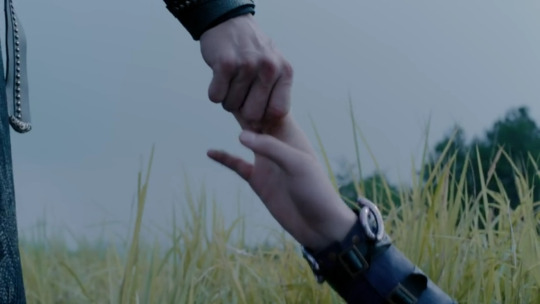
oh cinematically tragic lost handhold....
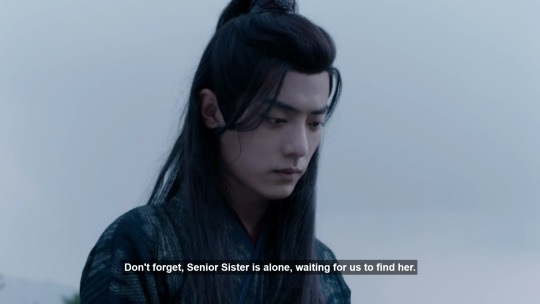
I've seen so many gifsets of wwx in this scene and that's because as terrible as everything is he has genuinely never looked better. very handsome. sorry about the tragedies

aw man there's jyl OH SHE HAS PEARLS SEWN INTO HER ROBE I wonder if the jiangs trade with sects that live along the ocean. do they have ocean access? I can't remember. maybe they're freshwater pearls

when jyl asks what happened and all wwx can do is stand there crying. and jc is also crying. oof
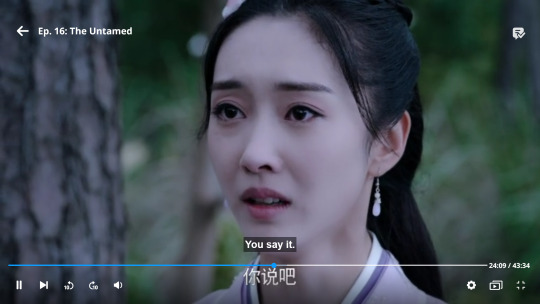
why did she tell wwx to do this...did she think jc couldn't?
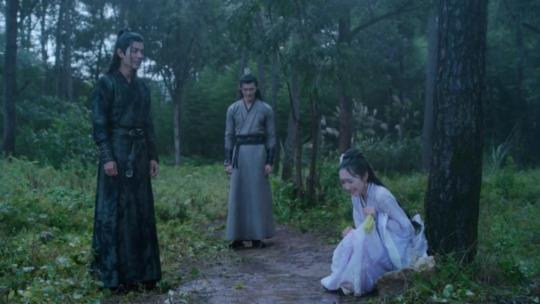
a triangle of misery...
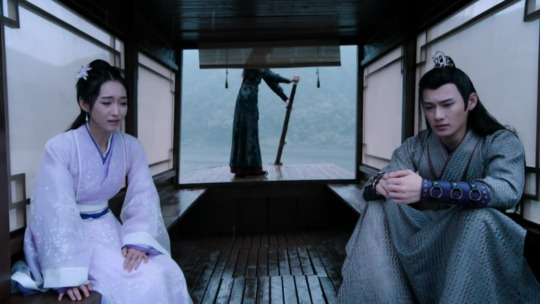
there's a really long meta post about the cinematography for this and I don't remember all of it but it's like. jyl and jc are in the foreground so their grief is being paid attention to, but wwx is in the back and you can't even see his face. his grief is ignored, even though he's the central figure. he's also taking on the task of a servant and neither jyl nor jc stop him
this is def a most extreme case (jc and jyl are SUPER traumatized and I'm not even blaming them for this), and it's not representative of all their interactions with wwx, but it gets me thinking. wwx talks about lwj being his equal bc he's good at things in the way that wwx is, but you can also view it like, with lwj wwx is completely free of the tangle of debts and obligations he has with the jiangs, and they look after each other , purely because they care about each other rather, than that onus always being on wwx. jyl does take care of him, and jc does too sometimes, but wwx must do the same for the other two and cannot truly fight back in a meaningful way if he's being mistreated.
obviously this setup above would never happen with lwj bc lwj doesn't see wwx as a servant or someone bound to him at all. he may see other people as servants, but he's always insistent that wwx is taken care of and he wouldn't accept wwx acting this way to him. which is really good! like I feel that ppl who are ride-or-die for yunmeng sibs and ignore lwj don't appreciate how freeing being with lwj is for wwx and how happy he is to have a relationship that's his own and on his own terms. ah, I miss him
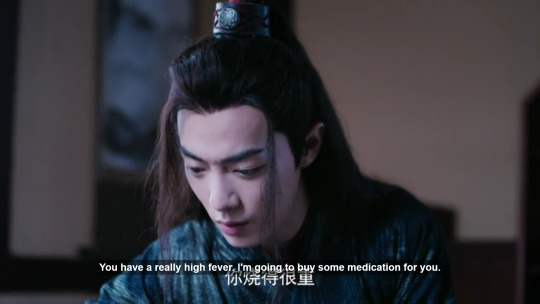
jyl getting ill so easily, I think she has an autoimmune disorder. I've seen her hced as having celiac's and having chronic joint pain, and I think either an autoimmune disease or chronic fatigue makes mot sense. and for some conditions, both of those symptoms are seen so it's not a stretch. fibromyalgia, for one
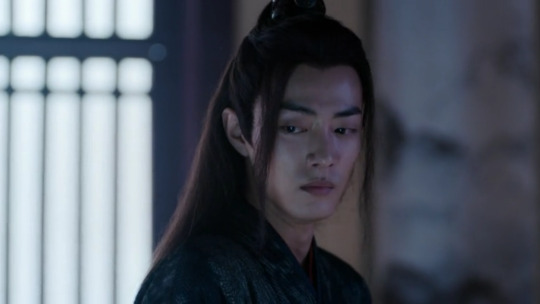

uh oh. last look before the end.
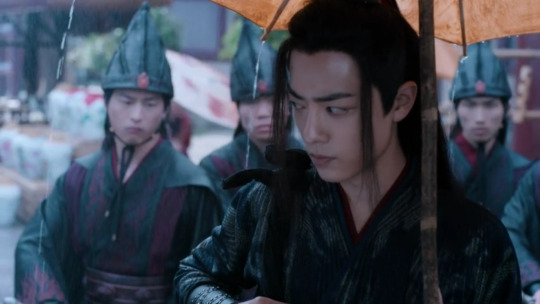
LIFE-ALTERING MOMENT. this scene is so well done. the dread I feel every single time. it's incredible.

literally who is that
flashforward to the scene in 18(?) where jc makes the same promise to jyl about wwx. I feel ill

something really messed up is how often one of the kids will be like 'we'll go together, right"? this past few episodes. they really are clinging to each other like buoys in a storm
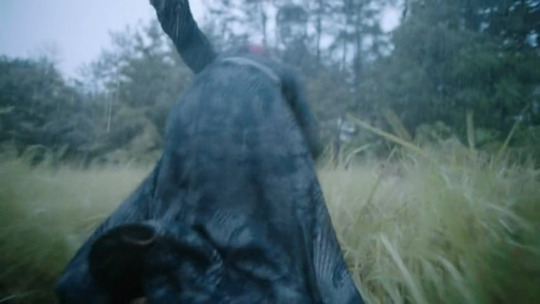
this happened when wwx was running out of BM after waking up from wen qing's needle. he runs and falls over :(
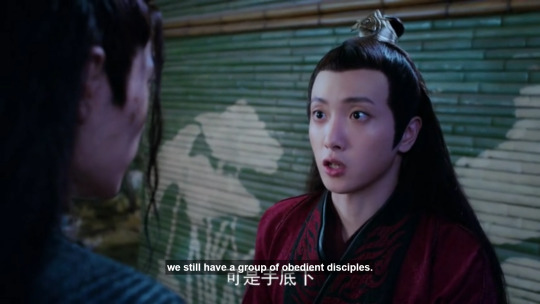
oh jeez I bet they're all dead by the end of this huh
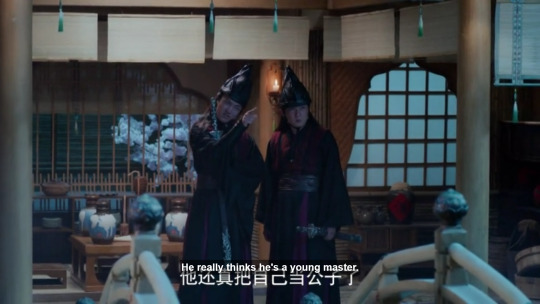
MEAN TO WEN NING. he lied kind of awkwardly but it WAS effective. a nice thing about being known for being weak and socially awkward is that nobody suspects you when you're being suspicious
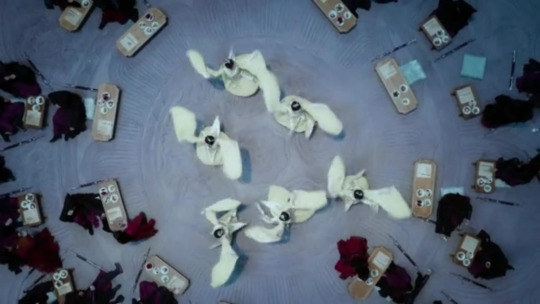
I wonder what happened to those women too. I assume they're wens, unless they were hired by wens. the clan is fucking huge idk

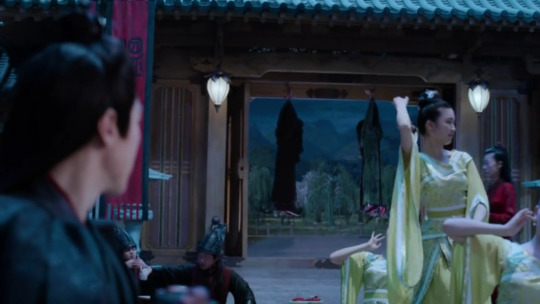
HE KNEW. and he knew it could have been lethal, I assume, unless he detected the exact poison used. and he somehow knew it was for the bodies of the jiang parents, huh
next episode will also be pretty rough but sunshot/postsunshot are among my favorite arcs so I am HYPED
also we'll finally see lwj again next ep. I think. I miss him. I wonder how many eps jc is missing from. surely several in a row, esp postres. yi city for sure. he's been in every one so far. now I'm curious
3 notes
·
View notes